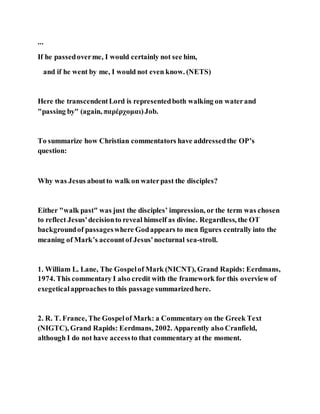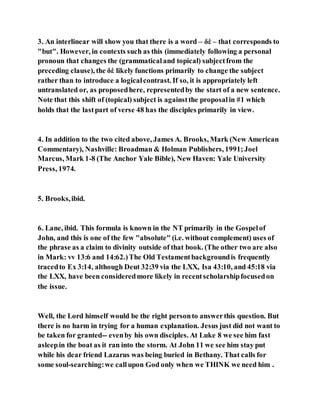The document explores the concept of Jesus making a pretense of leaving in Luke 24:28-29 to prompt his disciples to desire his presence. It discusses the necessity of actively seeking and maintaining a relationship with Christ, emphasizing that spiritual experiences can fade if not nurtured. Ultimately, it highlights that human desire can influence divine interaction, encouraging believers to express genuine longing for Christ's companionship.
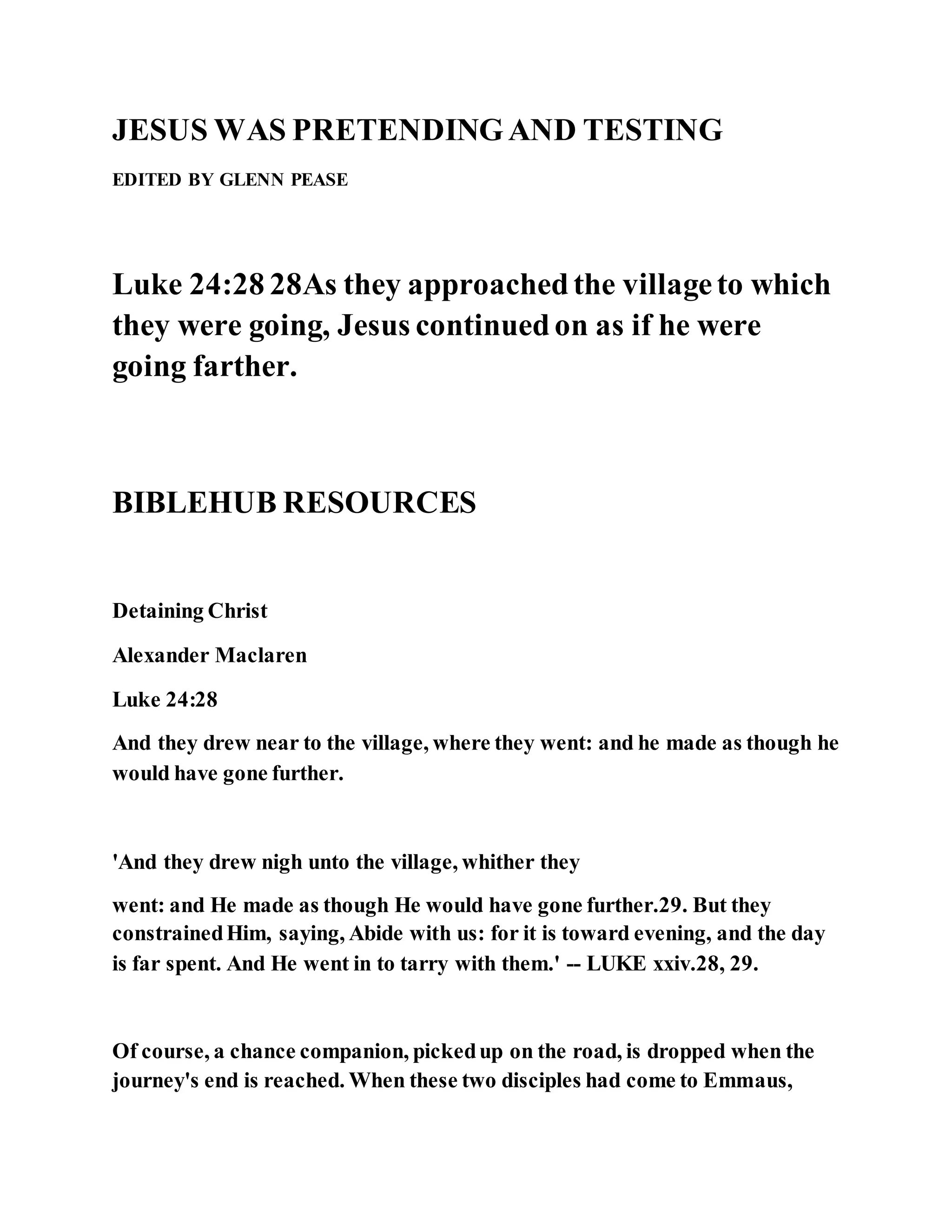
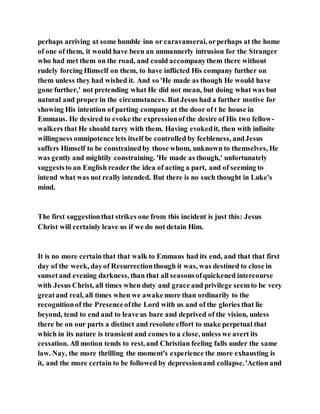
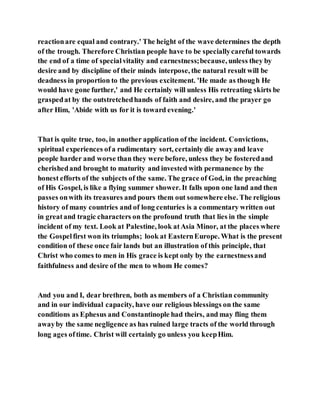
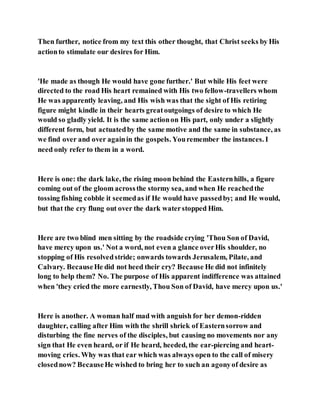
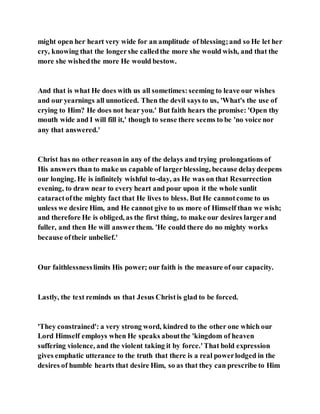
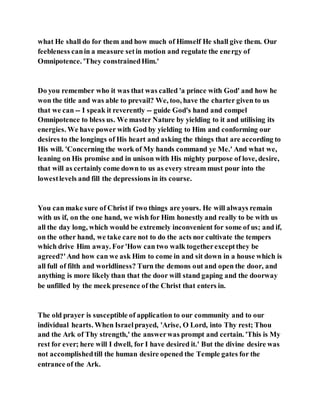
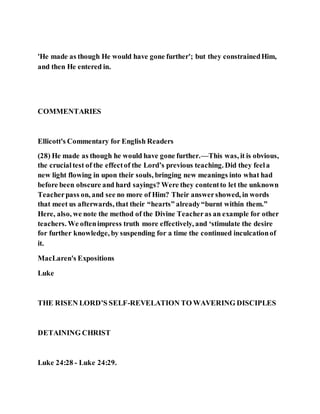
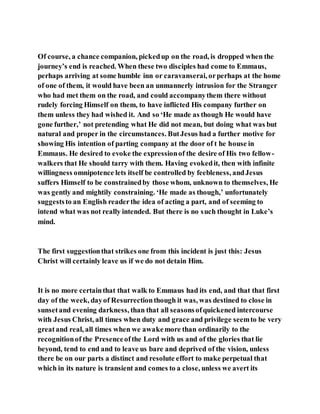
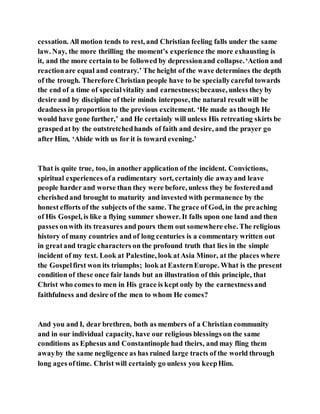
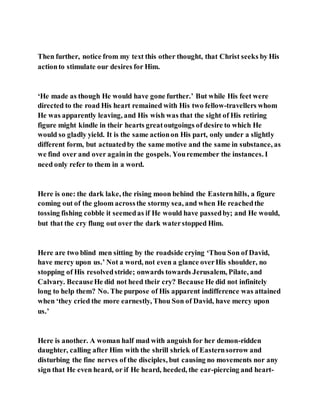
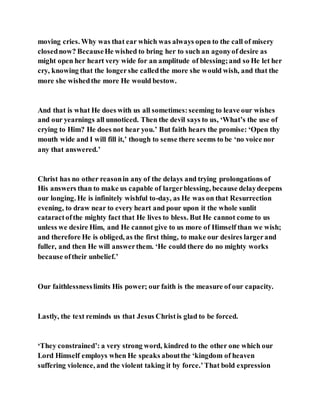
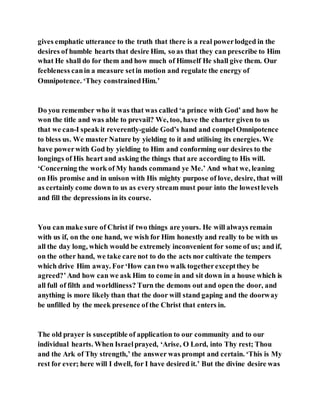
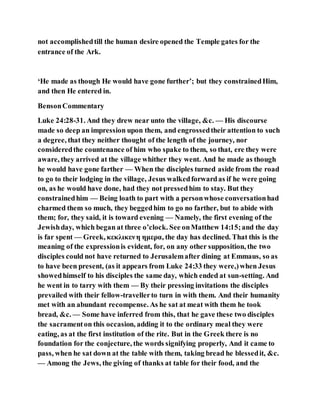
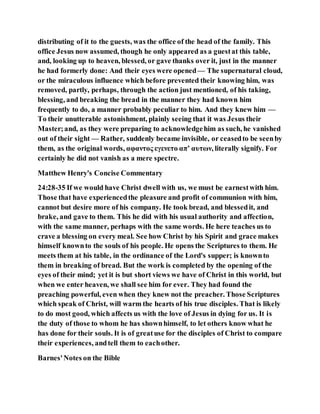
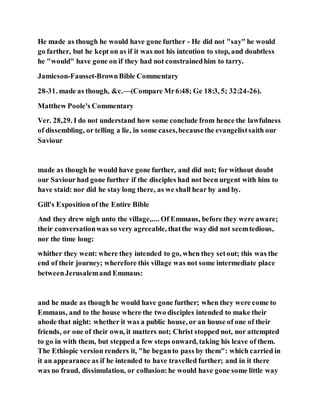
![further, doubtless, had they not detained him; and he intended to staywith
them, provided they should ask him, as he did, though not all night, which he
never designed: the whole of it is nothing else but a piece of modesty, civility,
and prudence; for guile was never found in his mouth.
Geneva Study Bible
And they drew nigh unto the village, whither they went: and he made as
though he would have gone further.
EXEGETICAL(ORIGINAL LANGUAGES)
Meyer's NT Commentary
Luke 24:28-29. Ἐσχηματίζετοποῤῥωτέρω πορεύεσθαι ὡς ἁπλῶς
συνοδοιπόρος, Euthymius Zigabenus. He desired to prompt the invitation,
which was a matter of decorum, but knew that it would follow. Comp. Mark
6:48. The imperfect προσεποιεῖτο (He feigned, gave Himself the air) and then
the aoristπαρεβιάσαντο:a lively representation.
πορεύεσθαι]not: that He is constrained or wishes to go farther, but we must
conceive that for appearance’sake He actually beganto move forward.
Luke 24:29. On παρεβιάσ., they constrained, to wit, by means of urgent
entreaty, comp. Acts 16:15;Genesis 19:3;also ἀναγκάζειν, Luke 14:23;
Matthew 14:22. They felt their holiestinterests engagedto this stranger(Luke
24:32). That these two disciples dwelt in Emmaus is possible, but follows just
as little from μεῖνον μεθʼ ἡμῶν(comp. τοῦ μεῖναι σὺν αὐτοῖς)as from εἰσῆλθε.
For to the latter expressionis not to be supplied εἰς τὴν οἰκίαναὐτῶν, but
from Luke 24:28 : εἰς τὴν κώμην;that invitation, however, does not of
necessitymean: stayin our lodging, but may just as wellsignify: stay in our
company, pass the night with us in the house of our host. Comp. John 1:39 f.
Expositor's Greek Testament](https://image.slidesharecdn.com/jesuswaspretendingandtesting-200829123525/85/Jesus-was-pretending-and-testing-16-320.jpg)
![Luke 24:28. προσεποιήσατο, He assumedthe air of one going farther. The
verb in the active means to bring about that something shall be acquired by
another, in middle, by oneself= “meum aliquid facio” (Alberti, Observ. Phil.,
ad loc.). Jesus wishedto be invited to stay.
Cambridge Bible for Schools andColleges
28. he made as though he would have gone further] Rather, would go. It is of
course implied that He would have gone further, but for the strong pressure
of their entreaty. Comp. Mark 6:48. We learn from these passageshow
needful it is to win Christ’s Presenceby praying for it.
Bengel's Gnomen
Luke 24:28. Προσεποιεῖτο)He made (acted)as though He was about to go
farther; and He had been about to go farther, had not they besoughtHim, and
perhaps had been about to appear to them in another way.
Pulpit Commentary
Verse 28. - And they drew nigh unto the village, whither they went: and he
made as though he would have gone further. This was no feint or deception.
The Lord would have left them then to themselves had they not prayed him
with real earnestnessto abide with them. "How many are there," says Stier,
"to whom he has drawn near, but with whom he has not tarried, because they
have suffered him to 'go awayagain,'in his living and heart-moving words!
How comparatively rare is it for men to reachthe full blessing they might
receive (see, for example, the striking historicalinstance, 2 Kings 13:14, 19)!"
But these were not content to let the unknown Teacherpass on, and see no
more of him, and hear no more of his strange powerful teaching. It is the
words of, and the thought containedin, this verse which suggestedthe idea of
the well-knownhymn -
"Abide with me; fast falls the eventide."
Vincent's Word Studies](https://image.slidesharecdn.com/jesuswaspretendingandtesting-200829123525/85/Jesus-was-pretending-and-testing-17-320.jpg)
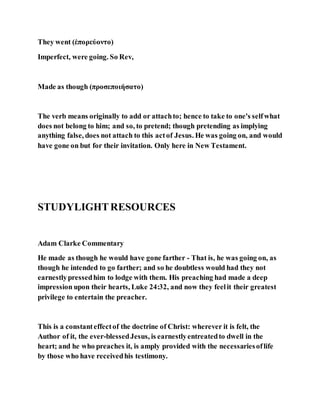
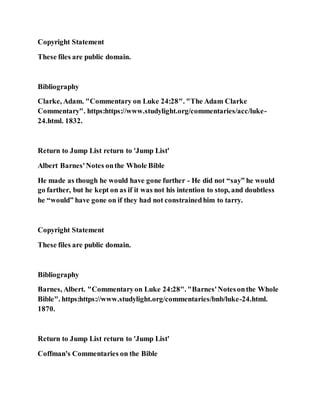
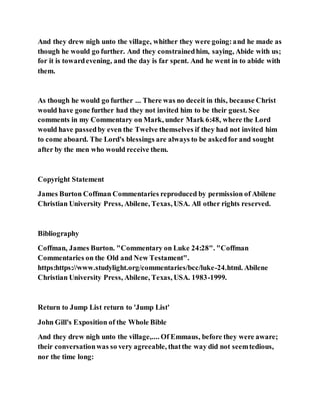
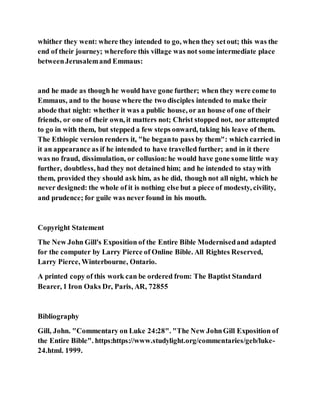
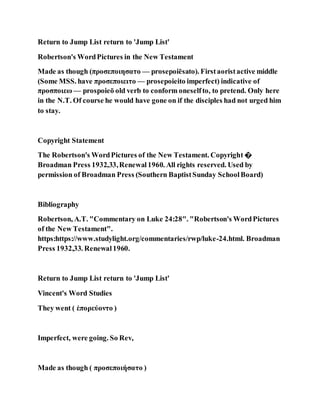
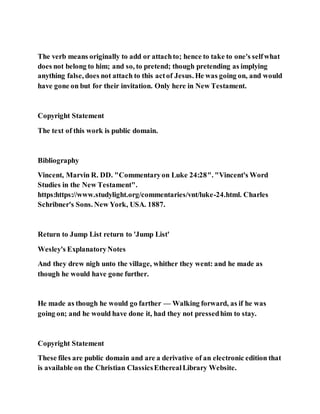
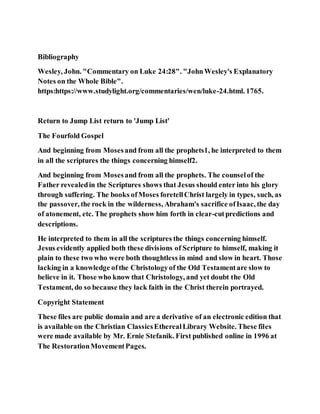
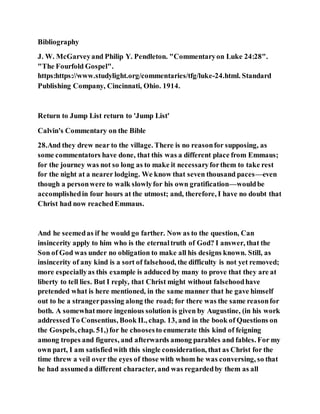
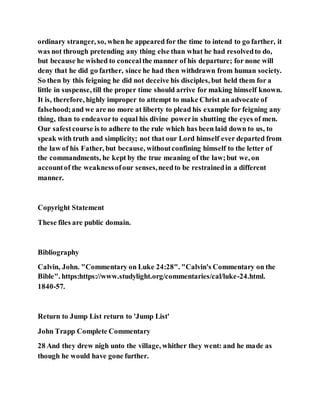
![Ver. 28. And he made as though he would, &c.] So did the angels to Lot,
Genesis 19:2. See the like, Joshua 8:5-6, 1 Kings 3:24. If Solomonmight make
as though he would do an actthat was unlawful, we may surely do the like in
things indifferent. Yet this was never done, as is well observed, but, 1. By
those that had authority over others; 2. For some singular goodto them with
whom they thus dealt.
Copyright Statement
These files are public domain.
Text Courtesyof BibleSupport.com. Used by Permission.
Bibliography
Trapp, John. "Commentary on Luke 24:28". John Trapp Complete
Commentary. https:https://www.studylight.org/commentaries/jtc/luke-
24.html. 1865-1868.
Return to Jump List return to 'Jump List'
Johann Albrecht Bengel's Gnomonof the New Testament
Luke 24:28. προσεποιεῖτο)He made (acted) as though He was about to go
farther; and He had been about to go farther, had not they besoughtHim, and
perhaps had been about to appear to them in another way.
Copyright Statement
These files are public domain.
Text Courtesyof BibleSupport.com. Used by Permission.](https://image.slidesharecdn.com/jesuswaspretendingandtesting-200829123525/85/Jesus-was-pretending-and-testing-27-320.jpg)
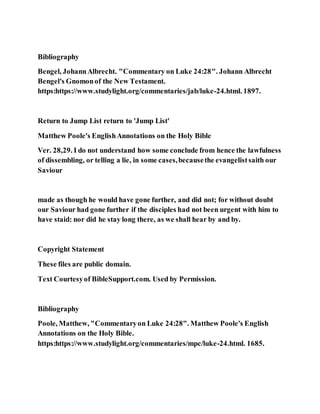
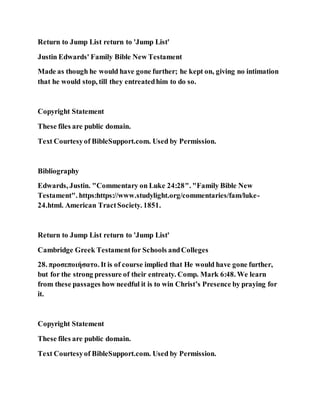
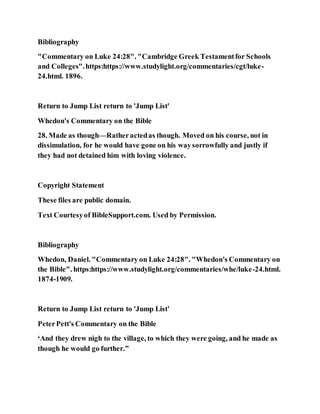
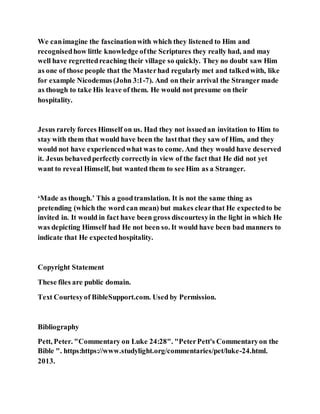
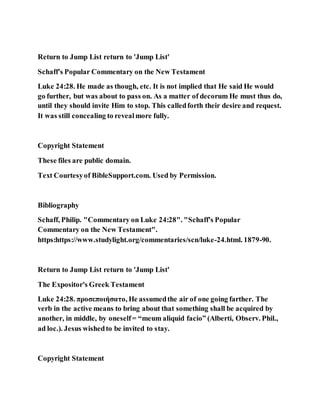
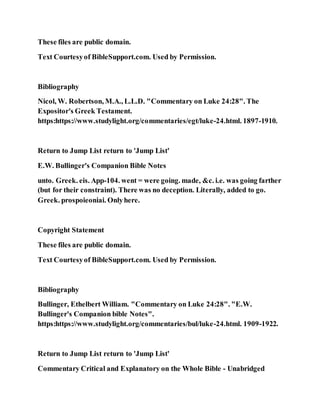
![And they drew nigh unto the village, whither they went: and he made as
though he would have gone further.
And they drew nigh unto the village where they went - or 'were going'[
eporeuonto (Greek #4198)].
And he made as though he would have gone further - but only "as though;"
for He had no intention of going further. So when He walkedtoward them on
the sea ofGalilee, "He would have passedby them" - but never meant to do it.
So Genesis 32:26. (Compare Genesis 18:3;Genesis 18:5;Genesis 42:7.)
Copyright Statement
These files are public domain.
Text Courtesyof BibleSupport.com. Used by Permission.
Bibliography
Jamieson, Robert, D.D.;Fausset,A. R.; Brown, David. "Commentary on
Luke 24:28". "CommentaryCritical and Explanatory on the Whole Bible -
Unabridged". https:https://www.studylight.org/commentaries/jfu/luke-
24.html. 1871-8.
Return to Jump List return to 'Jump List'
Ellicott's Commentary for English Readers
(28) He made as though he would have gone further.—This was, it is obvious,
the crucialtest of the effectof the Lord’s previous teaching. Did they feela
new light flowing in upon their souls, bringing new meanings into what had
before been obscure and hard sayings? Were they contentto let the unknown](https://image.slidesharecdn.com/jesuswaspretendingandtesting-200829123525/85/Jesus-was-pretending-and-testing-34-320.jpg)
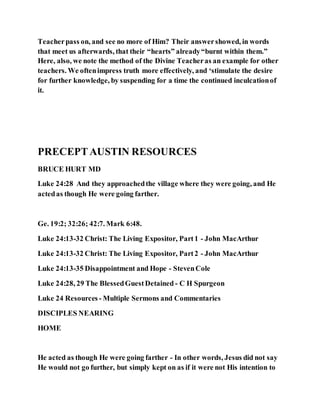
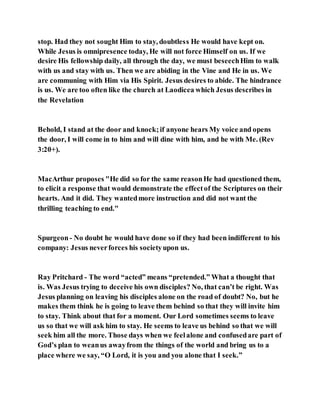
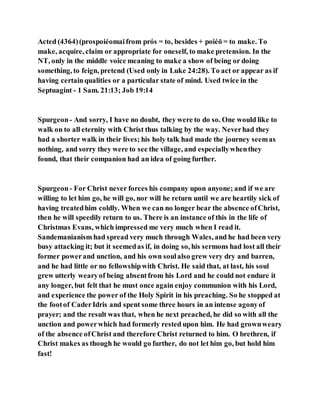
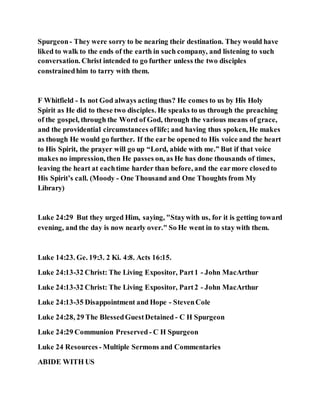
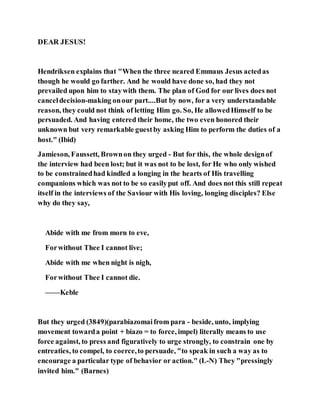
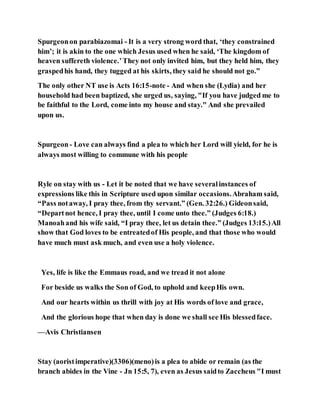
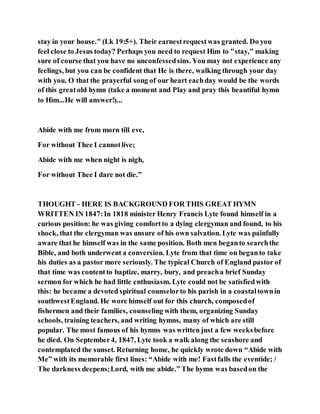
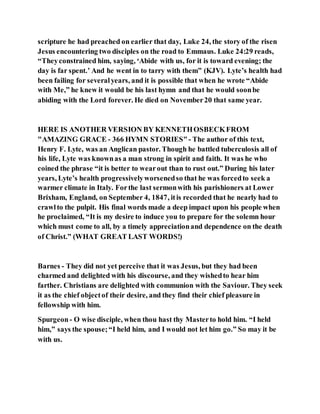
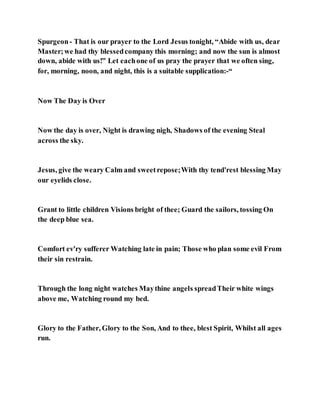
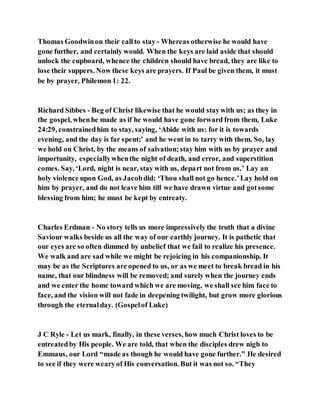
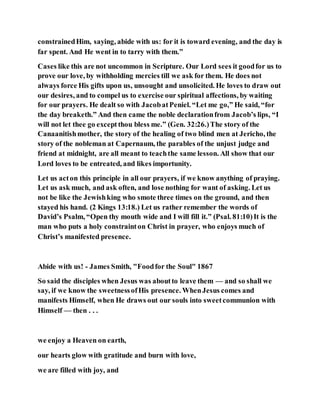
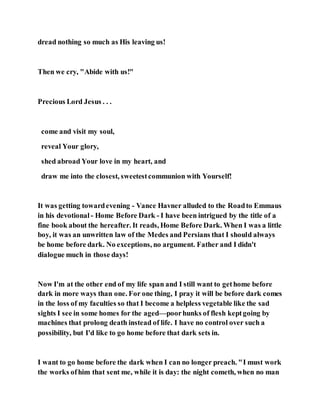
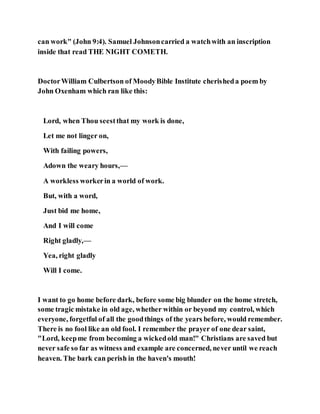
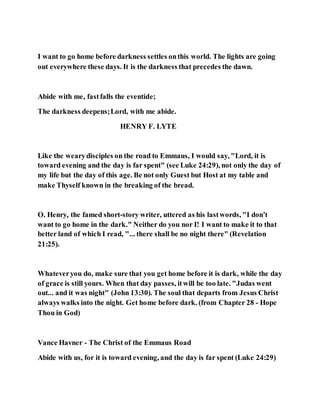
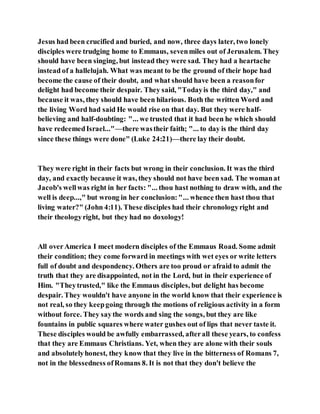
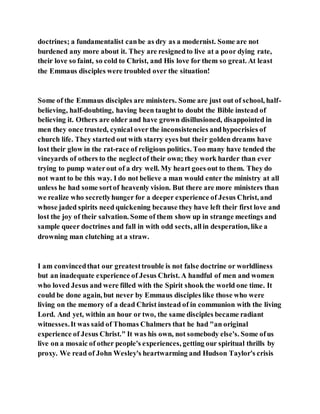
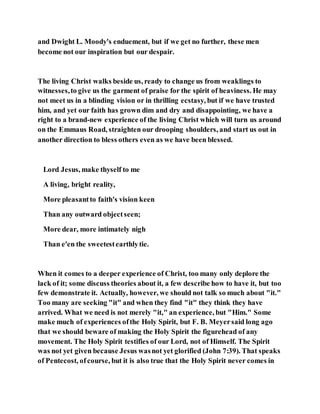
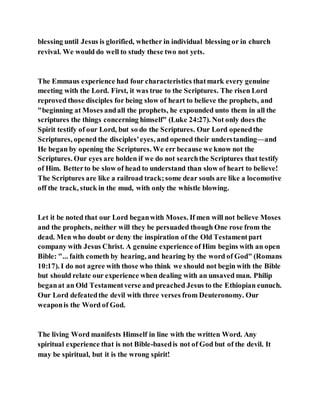
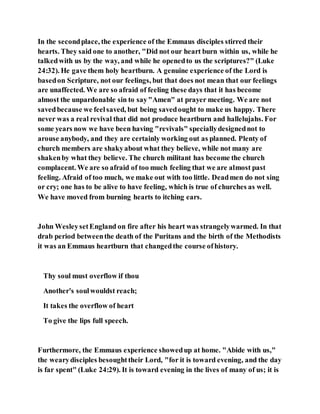
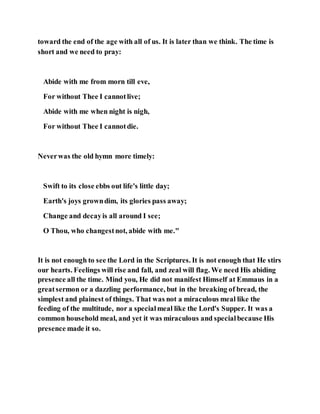
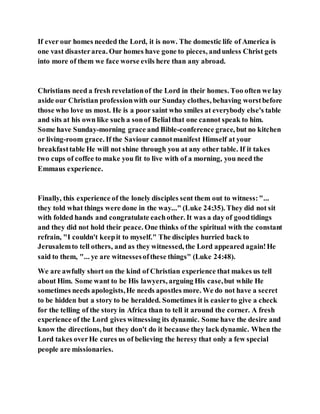
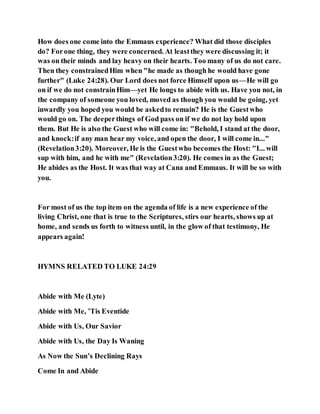
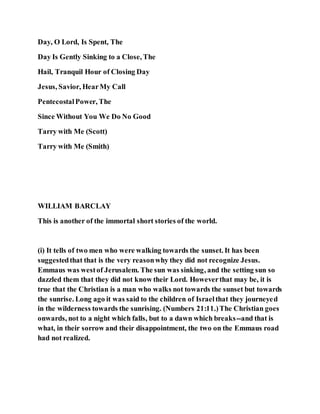
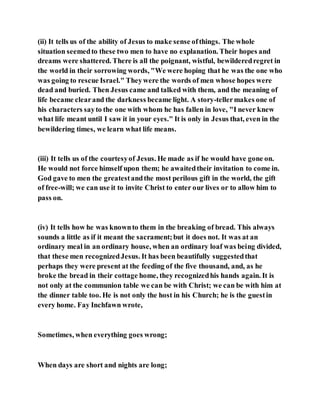
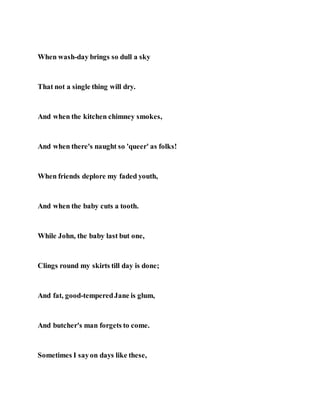

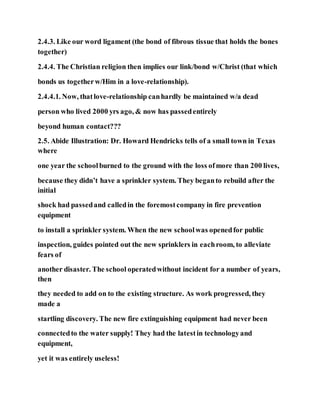
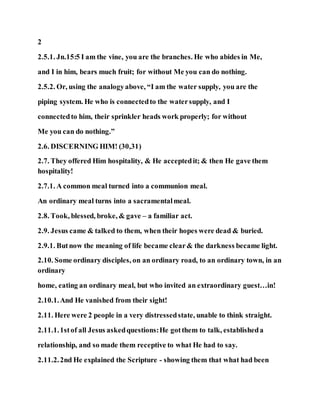
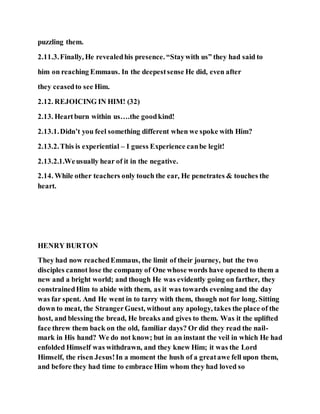
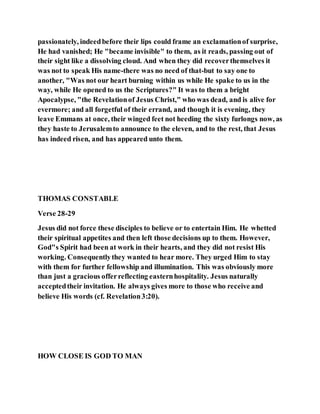
![Dr. W. A. Criswell
Luke 24:28-31
2-28-65 10:50 a.m.
I am preaching today on How Close Godis to Man, and how close in Him we
can be to eachother; and all of us, all the time, when we have got the love of
the Lord in our souls, happy and triumphant, glad and glorious, singing and
praising; it is that kind of a sermon. And if God will help me, I hope out of
the Word of the Lord you cansee it; if the Lord will bless me as I preach.
Now turn in your Bible to the twenty-fourth chapter of the Gospelof Luke;
Luke 24. I am going to read a passagethat will be the backgroundof the
message;Luke 24, verses 28 through 31 [Luke 24:28-31], and then verses 36
through 43 [Luke 24:36-43]. Now the first part, Luke 24:28;what I am
reading here is the Lord Jesus, raisedfrom the dead, resurrected[Luke 24:1-
7]—not in the days of His flesh—immortalized, glorified, He is eating. Watch
Him eat:
And they drew nigh unto the village, whither they went—
the two disciples going home to Emmaus—](https://image.slidesharecdn.com/jesuswaspretendingandtesting-200829123525/85/Jesus-was-pretending-and-testing-65-320.jpg)
![And He, the unknown Christ, raised from the dead [Luke 24:13-161]:
made as though He would have gone further.
But they constrainedHim, saying, Abide with us: it is towardevening, and the
day is far spent. And He went in to tarry with them.
And it came to pass, as He satat meat with them—
as He ate supper with them—
He took bread, and blessedit, and brake, and gave to them.
And their eyes were opened, and they knew Him; and He vanished out of their
sight.
[Luke 24:28-31]
Resurrected, raisedfrom the dead at supper table!
Now againat verse 36;the elevendisciples are in the upper room:
And as they talked to one another, Jesus Himself stoodin the midst of them,
and said Shalom, Peace be unto you.](https://image.slidesharecdn.com/jesuswaspretendingandtesting-200829123525/85/Jesus-was-pretending-and-testing-66-320.jpg)
![But they were terrified and affrighted, and supposed they had seena spirit.
And He said unto them, Why are you troubled? And why do thoughts arise in
your hearts?
Behold My hands and My feet, that it is I Myself:handle Me, and see;for a
spirit hath not flesh and bones, as you see Me have.
And when He had thus spoken, He showedthem His hands and His feet.
And while they yet believed not for joy, and wondered, He said unto them,
Have you here any thing to eat, have you here any meat? And they gave Him
a piece of a broiled fish, and of an honeycomb. And He took it, and did eat
before them.
[Luke 24:36-43]
Jesus, raisedfrom the dead, glorified, immortalized, breaking bread with His
disciples;eating broiled fish and the sweetnessofthe honeycomb [Luke 24:41-
42].
In the twenty-sixth chapter of the First Gospel, the Lord said to His disciples
when He instituted the holy supper, He said, “Verily I sayunto you, I will
drink no more henceforth of this fruit of the vine, until that day when I drink
it new with you in My Father’s kingdom” [Matthew 26:29]. And in keeping
with that promise that even in glory we should rejoice togetherat the table of](https://image.slidesharecdn.com/jesuswaspretendingandtesting-200829123525/85/Jesus-was-pretending-and-testing-67-320.jpg)
![the Lord; in the nineteenth chapter of the Revelation, which presents the
secondand final coming of our Lord in triumph and in glory [Revelation
19:6], the story begins with the marriage supper of the Lamb. “And blessed
are they who are calledto the marriage supper of the Lamb for the church
[Revelation19:9], the bride, hath made herself ready” [Revelation19:7], and
we are rejoicing in the Savior, world without end. Think of that, and the kind
of drink that is, is the kind the Lord saidis “new, new,” the kind God makes
[Matthew 26:29]. And the food we share is manna from heaven, angels’food
[Revelation2:17].
What an idea, and to a supercilious spiritualist, how gross and how material.
But I am just an echo. I don’t invent this message. Idon’t think it up. I just
read the Bible and tell you what God says. And I am telling you that the idea
and the picture of the fellowshipof God’s children in this world, and in the
world to come, is one of joy, and gladness, and anticipation, and happiness,
and breaking bread, and drinking in glory together. That’s it! And if the
Lord will help me this morning, I am going to show you there never has been
anything but that, all the way through.
So we are going to start in the beginning. We are going to talk about ancient
sacrifice, ancientsacrifice. Forsacrifice was universally, universally the
whole substance and essence ofancientreligion. That was it, sacrifice. From
a thousand innumerable hilltops and temples in ancient Egypt, and Babylonia,
and Chaldea, and Samara, and Syria, and Assyria, whereverancient people
lived, all over their civilized world the smoke of their sacrificesarose toward
heaven.
Now what is the meaning of sacrifice? Whydid they do it? Where did it come
from? What does it refer to? Back there in the beginning, you have the story
of Cain and Abel. Abel is a herdsman, and out of the firstlings of his flock he
brought a lamb and offered it as a sacrifice to God. Cain was a tiller of the](https://image.slidesharecdn.com/jesuswaspretendingandtesting-200829123525/85/Jesus-was-pretending-and-testing-68-320.jpg)
![soil. He was a farmer, and out of the firstfruits of his increase he brought an
offering, a sacrifice to God [Genesis 4:2-4].
Now what did that mean? And why did they do it? We haven’t time this
morning even to walk into the library to look at the books that discuss the
meaning of sacrifice. Butas I read and as I study, it seems to me that
practically everything that a scholarly theologianwill say, why men sacrificed,
and what it refers to, practically everything they will say can be consigned
under four topics, summarized under four headings.
One: there are many scholars who think that sacrifice means a gift to God.
And certainly the words translated sacrifice meangift. Many of them do.
Minchah, the word for sacrifice literally means “gift.” Korban, a word for
sacrifice in the ancient Hebrew Bible, means “gift.” So they are certainly
correct, those who believe that a sacrifice was a gift to God. Out of the
firstlings of his flock, Abel brought a gift to the Lord, and out of the fruit of
his field, Cain brought a gift to the Lord [Genesis 4:3-4]. All right, that is one
theory.
A secondtheory of the meaning of sacrifice was one of propitiation; seeking to
get the god propitious toward the man, to send him rain or to bless him with
health or with increase, to make the Lord Godor their gods propitious,
favorably disposed. All right, that is a secondtheory.
A third theory of the meaning of sacrifice is one summed up in the word
expiation, the washing awayof our sins. A sinner man full of guilt would
come before his God and offer a sacrifice as expiation of his sins. And
certainly that is true. For over the head of the sacrificialanimal the sinner
confessedhis sins, and when the sacrificialanimal died it was as though
atonement had been made for the sinner [Leviticus 4:26-31].](https://image.slidesharecdn.com/jesuswaspretendingandtesting-200829123525/85/Jesus-was-pretending-and-testing-69-320.jpg)
![And the fourth theory is one of a communal meal. The offerer, the sacrificer,
was sharing a common meal with his God. And the Lord consumed His part
by fire [Leviticus 3:3-5], and the worshipper consumedhis part by eating with
his family, and his friends, and with the Lord [Leviticus 7:15-16, Numbers
28:2]. .
One common denominator in all of those four theories of sacrifice, it is this:
no matter what your theory, or what your explanation—and I think all four of
them are true. I think the sacrifice was a gift to God, I think it was a
propitiation, I think it was an expiation, I think it was a communal meal. But
out of all four of those theories, this is the common denominator of all
sacrifice and of all explanations: namely, that sacrifice was a shared meal.
That’s what it was. Isn’t that strange? Well, I am not going to saythat is
strange. It was a shared meal.
Now may I come to the outline of the sacrificialsystemin the Old Testament
in Israel? Let’s start with Moses, becausehe originated the Mosaic
legislation. Moses goes up to Pharaoh, and he says to King Pharaoh, he says,
“The Lord God of the Hebrews has commanded us to go out into the
wilderness three days’ journey, and there to sacrifice” [Exodus 5:1-3]. Then
the next time he said it, “There to make a feastto our God” [Exodus 10:9].
And you remember the rest of the story: and Pharaoh finally said, “Well, you
just go out there into the wilderness three days journey and there you worship
your God, but you leave your flocks and you leave your herds back home here
in Egypt” [Exodus 10:24]. And Moses repliedand said, “Notso, not so! For
when we go out three days journey into the wilderness to sacrifice for our
God, we must have our herds and our flocks forofferings, for it is a feast, and
we are going to eattogetherout there in the wilderness with our Lord”
[Exodus 10:25-26]. That’s whatMoses saidto Pharaoh. And when you come
to the sacrificialsystemitself under the Mosaic legislation, from the beginning
that is what it was, a sharedmeal [Numbers 28:2]. .](https://image.slidesharecdn.com/jesuswaspretendingandtesting-200829123525/85/Jesus-was-pretending-and-testing-70-320.jpg)
![Well, let’s start with the Passover. And the Lord said,
On the tenth day of Nisan, choose a firstling of the flock, a lamb without spot
or blemish, and keepit four days until it is identified with the family. And on
the fourteenth of Nisan, at evening, slay it; sprinkle the blood on the lintels
and on the door posts in the form of a cross.
[Exodus 12:3-7]
And then, what do you do with the lamb? “You roastit in fire and eatit; and
no part of it is to remain until the morning. And if any part cannot be eaten it
is to be burned by fire” [Exodus 12:8-10]. The Passoverwas a meal. It was a
shared evening’s roast. It was something that the people ate together by
family groups [Deuteronomy 16:5-7].
Then all of the Mosaic sacrificialsystemthat followedafter was the same
thing. Forexample, in the eighth chapter of the Book of1 Kings you have the
story of the greatsacrifices by which they dedicatedSolomon’s temple [1
Kings 8:62]. “And on that day, they sacrificedto the Lord twenty-two
thousand oxen, and one hundred twenty thousand sheep” [1 Kings 8:63].
What did they do with those twenty-two thousand oxen? What did they do
with those hundred and twenty thousand sheep? [1 Kings 8:63]. They had
the most glorious time in barbeque, and in eating, and in sharing the meal
that the nation of Israelhad ever seenor known before. It was an enormous,
glorious convocationofGod’s people as they sang, and prayed, and praised,
and ate twenty-two thousand oxen and one hundred twenty thousand sheep[1
Kings 8:64-65].](https://image.slidesharecdn.com/jesuswaspretendingandtesting-200829123525/85/Jesus-was-pretending-and-testing-71-320.jpg)
![There is only one exception to all of this in the entire sacrificialsystemand
that was the whole burnt offering [Leviticus 1:3-17, 6:8-13]. But the whole
burnt offering was infinitesimally small compared to the vast offerings that
were made to the Lord God. The family ate them with their friends and
invited guests, and the Lord shared that meal by consuming His by fire
[Leviticus 1:13, 6:12-13]. That‘s what it was. Thatwas sacrifice. And when
we turn to the whole religious systemof the ancient Hebrews, it has in it a note
of glory, and happiness, and gladness without exception.
All of the greatconvocations ofIsraelwere feastdays, all of them. Passoverin
the spring was a feastday [Exodus 12:1-28, 43-49;Leviticus 23:5;
Deuteronomy 16:1-8]. The Feastof Unleavened Breadthat followedit for
sevendays was a feastweek [Exodus 12:5-2, 13:3-10, Leviticus 23:6, Numbers
28:17]. Pentecostfifty days later was a feast, the first of the summer, the
firstfruits [Leviticus 23:15-22;Deuteronomy 16:9-12]. The Tabernacles,the
FeastofTabernacles was a feast, the fall ingathering [Leviticus 23:33-43;
Deuteronomy 16:13-17]. New Year’s was a feastin the fall [Leviticus 23:24-
25]. Dedicationwas a feastin December[John 10:22]. Purim was a feastin
March [Ester9:26-32]. They all were feasts.
And then againyou had one exception. One day of the year was Yom Kippur,
the Dayof Atonement. That was a fastday, a day of affliction and confession
[Leviticus 16, 23:26-32;Numbers 29:7-11]. But outside of that whole burnt
offering [Leviticus 1:3-17, 6:8-10]., outside of that one fast day, a day of
atonement [Leviticus 16:1-34, 23:26-32, Numbers 29:7-11], everything that
Israeldid was a matter of singing, and rejoicing, and breaking bread, and
eating, and barbequing, and having the most glorious time in the world. And
they were sharing all of it before God. Thatwas sacrifice and that was the
religion of the ancientHebrew.](https://image.slidesharecdn.com/jesuswaspretendingandtesting-200829123525/85/Jesus-was-pretending-and-testing-72-320.jpg)
![Now when we come to the pages ofthe New Testament, it is the same and
identical pattern. It is one of glory, and gladness, and hallelujah, and singing,
and praising God––everybodybeing happy in the Lord, and eating all the
time, all the time, all the time—eating all the time.
For example, in the twelfth verse of the Book ofJude, Jude, the Lord’s half
brother—the brother of James, the pastor of the church at Jerusalem—Jude
says that “these folks there who feastwith you are,” and he describes them,
“in your agapais,” thatis plural for agape;the singular word agape in Greek
is the beautiful word for “godlylove, spiritual love, love” [Jude 12] Jerome
did his best to translate that Greek word into the Vulgate, and the English
translators did their best to translate that word in the King James Version.
And they came up with the word “charity” [1 Corinthians 13:13, KJV], which
to us means being kind to the poor but in that day meant “refined, highly
celestial, heavenlyaffection, love, charity, charitas [1 Corinthians 13:13].
Well, agape, they took that word “love” and they made it mean “a feast.”
When God’s children all came togetherthey shared an agape, a feast. They
loved one another, and they loved the Lord, and they ate together. That’s
what the Lord did with them in the days of His flesh. That’s what the Lord
did with them after He was raisedfrom the dead, and they continued that in
the church. Every community of Christ, every assemblyof the Lord met
togetherconstantly in those agapais love feasts [1 Corinthians 11:33, Jude
1:12].
Now they started off like that. Here is the waythe chapter on Pentecostends,
and I read it: “And they, continuing daily with one accordin the temple, and
breaking bread from house to house, did eattheir meat with gladness and
singleness ofheart, praising God and having favor with all the people” [Acts
2: 46-47]. Isn’t that a beautiful picture? And they, all of them continuing](https://image.slidesharecdn.com/jesuswaspretendingandtesting-200829123525/85/Jesus-was-pretending-and-testing-73-320.jpg)
![togetherwith one heart, and one soul, and one love, and one devotion, and one
commitment, and one affection.
“Theydid break bread from house to house and they did eat their meat with
gladness and singleness ofheart, praising God” [Acts 2:46]. And everybody
saw it and said, “Neversaw such a people like that, never saw sucha
community like that.” They are happy all the time. They are happy when
they don’t know anything. They are happy as if they did know something.
They are happy when they are poor. Theyare happy when they are sick.
They are happy when they are dying. They are even happy believing in the
Lord after death. “Forto me to live is Christ, and to die is a gain, a gain”
[Philippians 1:21]. Nobody eversaid that but a Christian. “Oh, preacher!
You don’t listen.” You just find me something like that in any ancient
literature of the whole creation. Why, it was marvelous, just looking at those
Christian people. I don’t know what they would think if they lookedat us
with all the murmuring, and griping, and complaining, and on and on. But it
wasn’t that group. Oh, they just marveled the whole world!
Now that leads me to a little exegesis here. It leads me to a little exposition
here. In the eleventh chapter of the Book ofCorinthians, and if you want to
turn to it, why, let’s look at it. The eleventh chapter of the Book of
Corinthians; 1 Corinthians, chapter 11, and we are going to begin at verse 20;
verse 20 of the eleventh chapter of 1 Corinthians [1 Corinthians 11:20].
Now remember the backgroundof the church; when they met togetherthey
ate together. Thatis what they did, they ate together[Acts 2:42, 46]. So in the
church at Corinth, they are falling into all kinds of things. Heresies, and
divisions, and oh! There is hardly anything you could mention that the
church at Corinth didn’t fall into. Well, one of the things they fell into was a
gross misuse of the agape. Now Idon’t have time to go into a whole lot of this,
so I am going to read it now and then sum it up, what he is talking about. We](https://image.slidesharecdn.com/jesuswaspretendingandtesting-200829123525/85/Jesus-was-pretending-and-testing-74-320.jpg)
![are going to begin in verse 20:“When ye come together, this is not to eatthe
kuriakos deipnon, the Lord’s Supper” [1 Corinthians 11:20], it is translated
here kuriakos deipnon
For in eating every one taketh before other his own supper: and one is
hungry, and another is drunken.
What? have ye not houses to eat and to drink in? or despise ye the church of
God, and shame them that have not? What shall I sayto you? shallI praise
you in this? I praise you not.
[1 Corinthian 11:21-22]
Then he recounts the institution of the Lord’s Supper [1 Corinthians 11:23-
30]. Now, the last two verses in that chapter, “Wherefore, my brethren,”
verse 33:
Wherefore, my brethren, when ye come together to eat, tarry one for another.
And if any man hunger, let him eat at home; that ye come not togetherunto
condemnation.
[1 Corinthians 11:33-34]
Now what is the trouble there with that church in Corinth and what are they
doing? Well, it is very plain when you study it carefully. It is very plain to see
what they were doing. Foryou see in the church in Corinth, and I suppose
this was true everywhere––whenthe people came togethereverybody brought](https://image.slidesharecdn.com/jesuswaspretendingandtesting-200829123525/85/Jesus-was-pretending-and-testing-75-320.jpg)
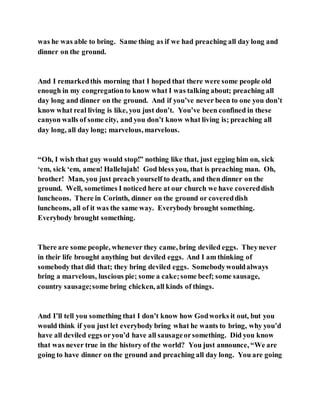
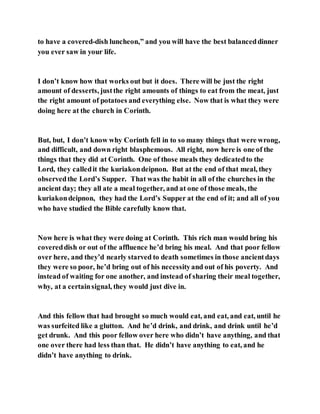
![And so some of them went awaydrunk and gluttonized, surfeited; and some
of them went away hungry and unwelcome. Paulsays, “Now you quit that,
you quit that, you stop that. And when you have your dinner there, when you
have your agape, whenyou have your love feast, you spread everything the
rich man according to affluence, the poor man according to his need, spread it
all out, and wait on one another, and wait on one another. Then when the
time comes, everybody shares everything that is brought. And if you are so
ravenous, and so hungry, and so voraciouslyinclined that you can’t wait for
the restof them, well you eatat home, and you blunt your appetite with
something. And then when you come you canact nice, and you can be
respectable, andgentle, in the house of the Lord” [1 Corinthians 11:33-34].
You know why I’ve gone in to all this? I am just emphasizing the factthat in
the first Christian communities, as it was in all of the ages before, God’s
people had a glorious time. And one of the evidences of that time was their
being together, eating together, praising God together, singing together, just
being happy in the Lord. Now that’s the Bible.
Now I want to speak of us today. What have we done to the church today?
And what have we done to the worship of our Lord today? I’ll tell you what
we’ve done to it. By and large, looking over the whole mass of it, by and large
it is killed dead like a corpse, and rote, dry like a potsherd. And by and large
the greatpopulus goes to church as though they were enduring an iron
sentence. And the benediction sounds like an amnesty to them, and they beat
it out. Then they are free of it until the next seven days comes around. “Now
we got to go to that church again.” And we endure it. And we sit there for
duty’s sake, orrespectability’s sake. And after it is over, off we are gone
againand forgetit until sevendays comes around.
They go to church on Sunday. They’ll be all right on Monday. It is just a
little habit that they have formed. But there is no wild gladness in it. There is](https://image.slidesharecdn.com/jesuswaspretendingandtesting-200829123525/85/Jesus-was-pretending-and-testing-78-320.jpg)
![no celestialhappiness in it. There is no triumphant glory in it. Oh, there is no
abounding hallelujah! There is no anticipation in it. It is just something that
we’ve got to do. “My grandfather did it and my father did it. And for
respectability’s sake, here I am doing it.”
But our real joy, and our real interest, and our realanticipation lies out there
somewhere in the amusement world, or in the entertainment world, in the
recreationalworld. Man is betweenworshipping God, being with the Lord’s
people, “and that boat I’ve got. I’d a thousand times rather have the boat, for
certainly,” they say. “And as betweengoing to church and putting my life
down there with the people of the Lord, I’d a thousand times rather be out
here in some kind of an amusement or recreationalworld.” Thatis the
modern church.
Consequently, it gets more cold, and more formal, and more sterile, and more
empty all the time until it finally is just something that you kind of put up
with––the church. I am just saying to our souls by the Word of the Lord, that
the worship of God and the religion of the Bible were a thousand miles
different from that; no melancholy, no lugubrious sentences, no more dread
and foreboding, no coercive necessity.
But when it came to being with God’s people and worshipping the Lord, it
was the highest, heavenliestanticipation. It was the most glorious, hallelujah
fellowship. It was the most marvelous thing of all life. That is the wayit was
here in the Bible.
I want to illustrate that to you. In the Book ofPsalms, in the Book of Psalms,
that was the hymnbook of the ancientHebrew. In the Book ofPsalms, after
the one hundred and nineteenth––whichis the longestone in the Bible––after
the one hundred and nineteenth [Psalm 119:1-7], there are fifteen Psalms that](https://image.slidesharecdn.com/jesuswaspretendingandtesting-200829123525/85/Jesus-was-pretending-and-testing-79-320.jpg)
![are labeledin their ancient, ancient––nobodyknows how ancient, far back as
these have ever been known––theywere called, and we have it translated in
the King James Versionhere, Songs ofDegrees [Psalms 120-134]. The Latin
Vulgate and the Septuagint would translate that Songs ofSteps of Ascent.
The literal Hebrew word is they are “songs ofgoings up.”
Well, what “goings up”? Now there are two things that a scholarwill say
about it. Some scholars saythere were fifteen steps going up from the outer
court into the inner court. And as they went up into the sanctuary, they sang
one of these steps on the lower, the next step, the next step, until they sang
those fifteen songs going up. There are other scholars who say––andit is this
one that appeals to me––there are other scholars who say that those fifteen
psalms of degrees, ofascents,ofsteps, literally of goings up; that those fifteen
psalms were pilgrim songs. And as the Hebrew pilgrim made his way up––
and you always go up to Jerusalem;from Samaria north, you go up to
Jerusalem;from Hebron south, you go up to Jerusalem;from Jaffa west, you
go up to Jerusalem;from Jericho east, you go up––always you go up to
Jerusalem. So these scholars saythat these fifteen songs are pilgrim hymns
that the worshipper of God sang as he went up to Jerusalemand to the house
of the Lord.
Now catchtheir spirit, listen to them. First one, “I will lift up mine eyes unto
the hills, from whence cometh my help. My help cometh from the Lord,
which made heavenand earth” [Psalm121:1-2]. The next one:
I was glad when they said unto me, Let us go into the house of the Lord.
Our feet shall stand within thy gates, O Jerusalem.](https://image.slidesharecdn.com/jesuswaspretendingandtesting-200829123525/85/Jesus-was-pretending-and-testing-80-320.jpg)
![Jerusalemis a city compact. Whither the tribes go up, the tribes of the Lord,
unto the Testimonyof Israel, to give thanks unto the name of the Lord.
For there are set thrones of judgment…
Pray for the peace of Jerusalem:they shall prosper that love thee. Peace be
within thy walls, prosperity within thy palaces.
For my brethren and companions’ sakes, Iwill now say, Peace be within thee.
Becauseofthe house of the Lord our God I will seek thy good.
[Psalm 122:1-9]
Singing as they went up to Jerusalem.
The next one, “Unto Thee lift I up mine eyes, O Thou that dwellestin the
heavens” [Psalm123:1]. The next one, “Theythat trust in the Lord,” sing
that often for me:
They that trust in the Lord, shall be as Mount Zion, which abideth for ever.
As the mountains are round about Jerusalem, so the Lord is round about His
people from henceforthand for ever.
[Psalm 125:1-2]](https://image.slidesharecdn.com/jesuswaspretendingandtesting-200829123525/85/Jesus-was-pretending-and-testing-81-320.jpg)
![The next one:
When the Lord turned the captivity of Zion, we were like them that dream.
Then was our mouth filled with laughter, and our tongue with singing; then
said they among the heathen, The Lord hath done greatthings for them.
The Lord hath done greatthings for us; whereofwe are glad.
[Psalm 126:1-3]
Turn the page, the next one; “Exceptthe Lord build the house, they labor in
vain that build it: except the Lord keepthe city; the watchmanwakethbut in
vain” [Psalm 127:1]. The next one, “Blessedis every one that feareththe
Lord; that walkethin His ways. Forthou shalt eat the labor of thine hands:
happy shalt thou be, and it shall be well with thee” [Psalm128:1].
And I’ve gotto close. Let’s take the next to the last one:
Behold, behold how goodand how pleasantit is for brethren to dwell together
in unity!](https://image.slidesharecdn.com/jesuswaspretendingandtesting-200829123525/85/Jesus-was-pretending-and-testing-82-320.jpg)
![It is like the precious ointment upon the head, that ran down upon the beard,
even Aaron’s beard: that ran down to the hem of his garments.
[Psalm 133:1-2]
Listen man, don’t you catchthe exaltation, and the triumph, and the glory,
and the victory, and the gladness, in those songs as they went up to the house
of the Lord? Can’t you as that psalm said. My neighbor saidto me “Let us
go up to the house of the Lord” [Psalm 122:1]. And I said, “I’d rather take a
beating.” And I said, “But I gota boat down there on the DeadSea.” ButI
said, “I gota journey to make up there to Galilee. We are shooting pheasants
up there, and they tell me that they are in season.”
Isn’t this great, isn’t this great? “Our feetshall stand within thy gates, O
Jerusalem” [Psalm122:2]. “I was gladwhen they said unto me, Let us go up
to the house of the Lord” [Psalm 122:1]. How beautiful and how heavenly,
when brethren gather togetherin unity. It is like the ointment of the Lord
God on the head that runs down on the beard, so abundant [Psalm133:1-2].
God sent forth His Holy Spirit of gladness and glory. It even reaches downto
the hem of the garment. Wonderful, happy, glad; rather be here than any
place in the world. Ratherdo what I do for nothing than what anybody else
does for pay. Justdon’t take me too seriouslyon that, you good deacons.
Well, our time is gone, and I want to say one other thing about that. Do you
remember my telling you when I came back from India? Do you remember
my telling you about that missionary? I tell you, that was the most dramatic
missionary I ever listened to in my life. There was a fierce tribe in India, and
no foreigner had ever lived who had visited them. To go there meant death
but God had called him. And in that dramatic way that he described it, he
said, “And I was seatedonthe brow of the hill, and I saw before me three](https://image.slidesharecdn.com/jesuswaspretendingandtesting-200829123525/85/Jesus-was-pretending-and-testing-83-320.jpg)
![thousand of those savage tribesmancoming towardme. But,” he said, “I was
perfectly unafraid. Forback of me, was our Baptist church, and before me
ran the course of the river; and those three thousand were dressedin white
baptismal robes, coming up that hill from the banks of the river. And as they
ascended, and I thought, we’ve gotus a song of degrees too, we’ve gotus a
song of ascenttoo.”
And as they ascended, that missionary said, they were singing a song. And
this was the song:
Happy day, happy day
When Jesus washedmy sins away
He taught me how to watchand pray,
And live rejoicing everyday
Happy day, happy day,
When Jesus washedmy sins away.
[“O Happy Day, That Fixed My Choice”;Philip Doddridge]](https://image.slidesharecdn.com/jesuswaspretendingandtesting-200829123525/85/Jesus-was-pretending-and-testing-84-320.jpg)
![That’s what it is to be a Christian; it is singing in the night, it is singing in the
day, it is singing in goodhealth, it is singing in sickness, it is singing in youth,
it is singing in old age. It is rejoicing in God while we live; it is rejoicing in
Jesus whenwe die.
Whenever you see me down, pray for me. Wheneveryou see me blue or
discouraged, pray for me, because Iam not reflecting the light of the
knowledge ofthe glory of God that shined in the face of Jesus [2 Corinthians
4:6] when I am that way. Forto be a Christian is to be triumphant and
victorious. God love us for ever, amen.
Well, the Lord grant that the pastor has somewhatsucceededin presenting
the scriptural messagethat to love God and to worship Jesus is a happy thing,
a marvelous thing, and to be togetherin the house of the Lord is something of
glory, and grandeur, and greatness, andgladness.
Now while we sing our appeal; in the balcony, round on the lowerfloor,
somebody you, give himself to Jesus [Romans 10:8-13]. Somebodyyou, put
his heart in the fellowshipof the church [Hebrews 10:24-25]. While we sing
the hymn, come and stand by me. “Pastor, todayI take the Lord as my
Savior, and here I am. I let the Lord Jesus in His saving grace come into my
heart and life, and here I am” [Ephesians 2:8]. Or a family you, a couple you,
one somebodyyou, coming into the fellowshipof the church, “Pastor, my wife,
my children,” howeverthe Lord shall make the appeal and speak the word,
make it now, make it today, while we stand and while we sing.](https://image.slidesharecdn.com/jesuswaspretendingandtesting-200829123525/85/Jesus-was-pretending-and-testing-85-320.jpg)
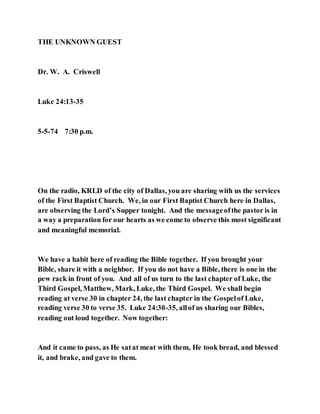
![And their eyes were opened, and they knew Him; and He vanished out of their
sight.
And they said one to another, Did not our heart burn within us, while He
talkedwith us by the way, and while He openedto us the Scriptures?
And they rose up the same hour, and returned to Jerusalem, and found the
elevengathered together, and them that were with them,
Saying, The Lord is risen indeed, and hath appearedto Simon.
And they told what things were done in the way, and how He was knownof
them in breaking of bread.
[Luke 24:30-35]
And you caneasily see why it is that the passageit chosentonight in
preparation for our memorial of the breaking of bread; “knownto them in
the breaking of bread” [Luke 24:35].
There was a greatFrench literary critic by the name of Renan. And Renan
said, though in so many areas ofhis life he was a bitter skeptic of the
Christian faith, Renan said that the most beautiful story in literature and in
language is the story here in the twenty-fourth chapter of the Gospelof Luke.](https://image.slidesharecdn.com/jesuswaspretendingandtesting-200829123525/85/Jesus-was-pretending-and-testing-87-320.jpg)
![It goes like this. Towardthe evening there are two disciples of the Lord.
After the Lord’s crucifixion and on Sunday, the third day after the Lord’s
death, they are walking along from Jerusalemto their home in Emmaus
[Luke 24:13-14]. Emmaus is northwest of Jerusalem, about sevento eight
miles. It is sixty furlongs away. Going by the way of the tomb and past the
ancient city of Mizpah, just before the road turns down into the valley of
Ajlalon, there was the little town of Emmaus.
And the two walk along and are sad [Luke 24:17]. The reasonfor their
sadness is the crucifixion of their Lord [Luke 24:19-20]. Theyhad been with
Christ in the days of His flesh, had seenHis incredible miracles, had listened
to His wonderful words, had found in Him every holy promise that God had
made for the kingdom of Israel. And their hopes had risen higher and higher
and higher until they reachedthe very arch of the sky.
Then they were dashed into the dust of the ground. They not only had seen
the marvelous works of the Lord and heard His glorious words, but they had
watchedthe Romansoldiers nail Him to a cross and they had seenHim die
[Luke 23:26-46]. As they walk along from Jerusalemto their home in
Emmaus, they are sad [Luke 24:17].
There is no sadness like spiritual sadness. There is a sadness ofan exile far
awayfrom home. There is a sadness ofold age, seeing the sands of life run
out. There is a sadness of an open grave, seeing someone youlove lowered
beneath the sodand the clod. But there is no sadness like a spiritual sadness.
When the heavens are turned to brass and when the earth is turned to iron,
when God doesn’t seemto live and He doesn’t hear and answerprayer, when
the Bible has lost its promise and its freshness and when the services of the](https://image.slidesharecdn.com/jesuswaspretendingandtesting-200829123525/85/Jesus-was-pretending-and-testing-88-320.jpg)
![church are a weariness and when heavenseems shut up to our hearts and our
petitions and our cries, there is no sadness like spiritual sadness.
And in hopeless, helpless bereavementthese two disciples walk along and are
sad. And while they walk, communing in those hushed and gloomy tones,
suddenly there is a third who comes and walks with them. It is Jesus, and
they don’t know it for their eyes were holden of God that they didn’t
recognize Him [Luke 24:15-16]. So as they walk along and are sad, this
strangerwho joins them in the road asks them, “Why are you so sad?” [Luke
24:17].
And one of them, whose name was Cleopas, answeredand said, “Are You the
only one in Jerusalemwho does not know what things have come to pass?”
And He said, “What things, what things?” [Luke 24:18-19].
And they said, as though it were just an opportunity to pour out their hearts,
pent up with indescribable, unfathomable, immeasurable grief, they poured
out to Him the story of the despair that had seizedtheir hearts when they
watchedthe Saviordie [Luke 24:19-24].
Who are these two who are so signally blessedthat the Lord raised from the
dead that Sunday should walk along by their sides? We don’t know. One of
them is named Cleopas [Luke 24:18]. Who is Cleopas? Nobodyknows. He’s
never mentioned exceptjust there. And the other one is nameless.
Do you see the heart of our Lord in this? Had our Lord revealedHimself,
walkedalong, appearedto one of the eleven, I would not have been surprised.](https://image.slidesharecdn.com/jesuswaspretendingandtesting-200829123525/85/Jesus-was-pretending-and-testing-89-320.jpg)
![Had it been He was talking with James and John as they walkedalong, I
would not have been surprised. But the Lord reveals Himself and walks along
with these two unnamed, unknown ones [Luke 24:13-17, 35].
A humble disciple of the Lord, of whom we know nothing at all. Isn’t that the
spirit of our Savior? He was that way in the days of His flesh. How
consistentlyand how faithfully did the Lord minister to and reveal Himself to
nameless people.
For example, in the fourth chapter of the Book of John, who is that Samaritan
woman to whom He revealedHis heart as the Saviorof the world and to
whom He preachedthe greatestsermonon spiritual worship the earth has
ever heard? [John 4:7-26]. Who is that woman? We don’t know. She was
just a despisedoutcastof a harlot [John 4:16-18]. And yet the Lord took time
to reveal to her the unfathomable glory of the spiritual worship of God [John
4:21-23].
Turn to the fifth chapter of the Book ofJohn. Who is that impotent man at
the poolof Bethesda who thirty-eight years was bound down with an
infirmity? Who is he? What is his name? Nobody knows. He was just an
outcast, a part of the flotsam and jetsamof life. Yet the Lord healedhim
[John 5:1-9].
Who is that blind man in the ninth chapter of the Book ofJohn whose eyes the
Lord opened [John 9:1-7], and who came to Him wanting to know who it was
that savedhim and the Lord spoke to him and forgave his sins, all blotted out
and gave him new life? [John 9:35-38]. Who is that blind man? Nobody
knows, nobody knows.](https://image.slidesharecdn.com/jesuswaspretendingandtesting-200829123525/85/Jesus-was-pretending-and-testing-90-320.jpg)
![That is the spirit of our Savior; raisedfrom the dead [John 20:1-16]. He is still
just the same. Ministering to nameless ones, just to people because He loves
them, for their own sakes;not because they are great, not because they are
rich, not because they are famous, not because theyare anything, but just
somebody who needs God.
When John saw our Lord raised, resurrected, immortalized, glorified, he
describes Him; the splendor of our iridescent and immortalized Savior
[Revelation1:9-18]. And when I think of Him, you know, it is hard for me to
believe that He still is just as He was in the days of His flesh. But this passage
says so. The hands that hold the sevenstars [Revelation1:16], are the same
hands that bless little children [Mark 10:16]. And the face that shined above
the radiance of the sun [Revelation1:16] is the same face that drew sinners to
His loving feet [Luke 5:8, 17:16]. And the breastgirt about with the golden
girdle [Revelation1:13], is the same breastupon which the sainted John
leaned at the memorial supper [John 13:23, 21:20]. It is the same Christ, and
here He is doing the same thing.
Resurrected, glorified, raisedfrom the dead, He is walking along, talking to
two nameless disciples [Luke 24:13-15]. Have no idea who they are. But oh,
how signally blessed! Isn’t it a wonderful thing to think I don’t have to be
rich for God to love me, and I don’t have to be famous, and sought out and
sought after, for Jesus to speak to my heart and to walk by my side, just as He
did on the wayto Emmaus?
And He said to them, “You seem so sad and in despairand downcast. Why?”
[Luke 24:17].
And they said, “Don’t You know what has happened in Jerusalemthese last
days?” [Luke 24:18].](https://image.slidesharecdn.com/jesuswaspretendingandtesting-200829123525/85/Jesus-was-pretending-and-testing-91-320.jpg)
![And He said, “What things?” [Luke 24:19].
And then they just poured out their hearts to Him. In one word they are up in
the highestskies in hope, and in the next word they are down in the deepest
valley.
Look at it. “And they said to Him, concerning Jesus, a Prophetmighty in
deed and in word before God and all the people” [Luke 24:19]. Up and up,
and then down: “And how the chief priests and rulers delivered Him to be
condemned to death, and they crucified Him” [Luke 24:20]. And then up:
“We trusted that it had been He which should have redeemedIsrael: all our
hopes were in Him.” Then down again:“Beside, this was the third day since
He was crucified” [Luke 24:21]. Then up again:“Oh, there were certain
women of our company who were early at the sepulcher;and they found not
His body, and they came running to us saying, ‘We have seena vision of
angels. He is alive!’” [Luke 24:22-23]. And then down again: “We went to the
sepulchre and we could not find Him: we saw Him not” [Luke 24:24].
Isn’t that our human nature? One day we are up and the next day we are
down. One day we are just as though we could hear the angels sing like this
choir, and then the next day we are so discouragedand blue we can’t hear
nobody pray. We just have to look up to look down; just so blue and
discouraged.
And then the Lord, “Beginning at Moses and the Prophets, He expounded”—
diermēneuō, diermēneuō. Always in the Bible that word means one thing:
translation, translation, translation. “And beginning at Moses andall the
Prophets,” beginning at Genesis and going clearthrough the Scriptures, “He](https://image.slidesharecdn.com/jesuswaspretendingandtesting-200829123525/85/Jesus-was-pretending-and-testing-92-320.jpg)
![expounded to them the things concerning Himself [Luke 24:27], how Christ
ought to suffer and to enter into His glory” [Luke 24:26].
You know, we are kind of like that. We leave out the cross. We love the
chromatic lens of the glory, but we leave out the crimson lens of the blood, and
the suffering, and the tears, and the agony, and the hurt, and the sorrow, and
the distress, and the grief, and the pain.
These men read the Book and never saw the cross, neversaw the sufferings.
They had placedin a goldencenserall of the hopes of Israel, and when they
saw Christ die, it burst, it broke and was dashedto the ground [Luke 24:21].
They never saw, as they read the Scriptures that innocent animal slain in the
garden of Eden [Genesis 3:1-6, 21]; they never saw it. They never saw the
paschallamb [Exodus 12:3-7, 12-13, 22-23]. Theyneversaw the daily
sacrifice [Exodus 29:38-42]. Theynever saw the Suffering Servant [Isaiah
53:1-12]. Theynever saw the smitten Shepherd of Zechariah[Zechariah
13:7]. Isn’t that a remarkable thing, how we canread the Bible and never see,
never understand?
They read the Scriptures. They were devout men. They had become disciples
of the Lord, and yet they never saw the necessityfor the suffering, the
crucifixion, the atonement [Luke 24:19-21]. Isn’t that a remarkable thing?
And if we are not carefulwe will be exactlylike it, exactly like them. We will
think of the Christian life in terms of the glory and of the blessing and of the
honor, and forget, it also has in it a crownof thorns and a crucified life and
tears and agonyand sobs [Matthew 27:29-50].
“Beginning at the Scriptures He showedthem how Christ should suffer”
[Luke 24:25-27]. These menhad come to look at the cross as though it were
somehow a mistake in heaven. It was an irreparable agonyand an abysmal](https://image.slidesharecdn.com/jesuswaspretendingandtesting-200829123525/85/Jesus-was-pretending-and-testing-93-320.jpg)
![tragedy. No. As He expounded to them the Word of God, the cross was in the
plan of the Lord [Luke 24:25-27]. It was a part of our redemption [1 Peter
1:18-19;Revelation5:9]. It was a necessity. Jesus hadto die if we were to be
saved[Matthew 26:28;Hebrews 9:22]. Atonement had to be made for our
sins [Romans 5:10-11].
As the Lord expounded to them the Word of God, how it was necessaryfor
Jesus to suffer and to die before He enters into glory [Luke 24:25-27], why,
the evening came on, and the sun beganto set, and they turned to go home,
and the strangeras though He would continue on down the road alone, and
they said to Him, “Come, abide with us. It is toward evening and the day is
far spent. Come” [Luke 24:28-29].
And He turned and walkedwith them, and it came to pass that as they sat at
the evening meal, He took bread, and He blessedit. And for the first time
they saw the nail prints in His hands. When He took the bread, and blessedit,
and broke it, they saw His hands. And when they heard Him say the blessing,
they recognizedHim [Luke 24:30-31, 35]. Evidently the Lord had a wayof
saying a blessing that was uniquely His. Like John recognizedHim when he
ran into the tomb and saw the napkin folded up by itself, Jesus had a way of
folding up a napkin and John recognizedit [John 20:4-8].
He had a way of saying a name, and Mary recognizedHim, when she thought
Him to be the gardener, by the way He pronounced her name, “Mary” [John
20:15-16]. And they recognizedHim in the way that He said the blessing and
when they saw the nail prints in His hands. And He vanished out of their
sight [Luke 24:30-31, 35].
It was sixty long furlongs back to Jerusalemand the evening tide had come.
But they couldn’t stay. They couldn’t stay. Their hearts were too glad. Their](https://image.slidesharecdn.com/jesuswaspretendingandtesting-200829123525/85/Jesus-was-pretending-and-testing-94-320.jpg)
![spirits were overflowing. And turning, they rushed back the eight miles to
Jerusalemand found the disciples and said, “We have seenthe Lord. He is
alive, He is alive, and He was known to us in the breaking of bread” [Luke
24:32-35].
Oh, how the world changes whenwe realize that Jesus is alive. He is alive. He
is alive [Acts 2:24; 1 Corinthians 15:20]. The road that is so long and lonely;
when Jesus is with you it becomes a glory road to heaven. And the buildings
that seeminglyfrown upon us become literal cathedrals that point up in glory
to the sky. And the whole earth is changedwhen we come to see that Jesus
lives. He is alive [John 14:19].
And is that not what Paul wrote in our salvation? “If thou shalt confess with
thy mouth Jesus as Lord, and believe in thine heart that God raised Him from
the dead,” that He lives, “thou shalt be saved” [Romans 10:9].
He was known to us in the breaking of bread [Luke 24:35]. “And they
returned to Jerusalemwith greatjoy: and were continually in the temple,
praising and blessing God. Amen” [Luke 24:52-53].
MATTHEW HENRY
They courted his staywith them: He made as though he would have gone
further he did not say that he would, but he seemedto them to be going
further, and did not readily turn into their friend's house, which it would not
be decent for a strangerto do unless he were invited. He would have gone
further if they had not courted his stay so that here was nothing like
dissimulation in the case. If a strangerbe shy, every one knows the meaning of](https://image.slidesharecdn.com/jesuswaspretendingandtesting-200829123525/85/Jesus-was-pretending-and-testing-95-320.jpg)
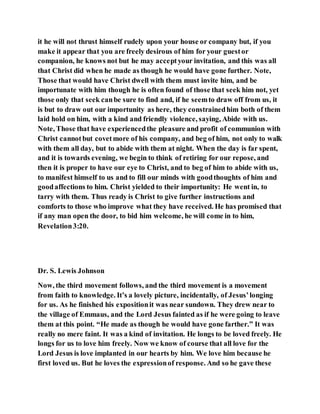
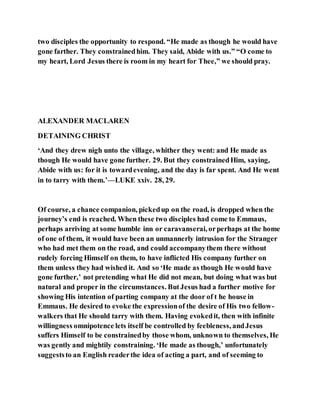
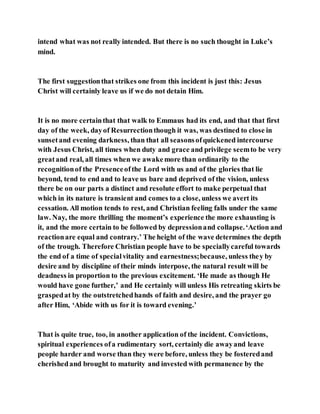
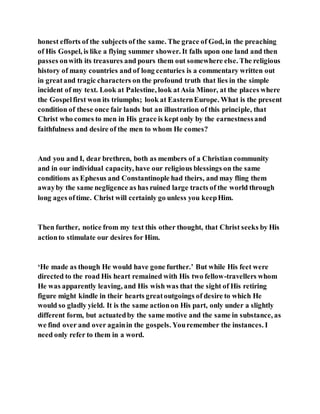
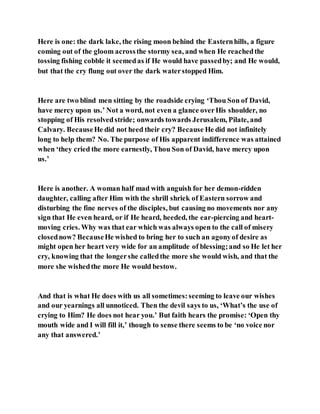
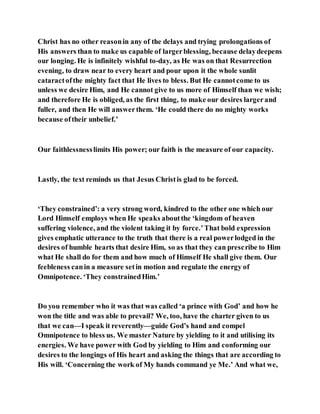
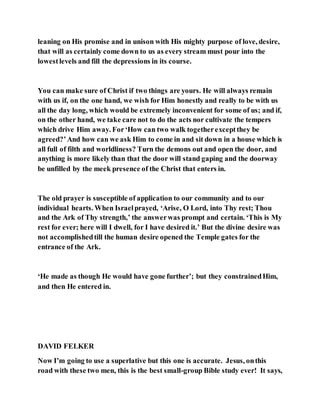
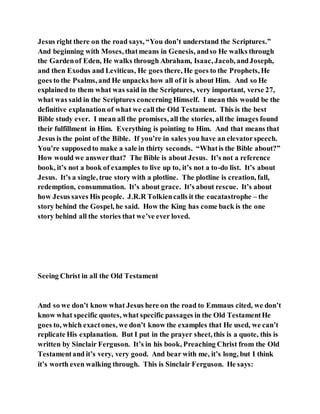
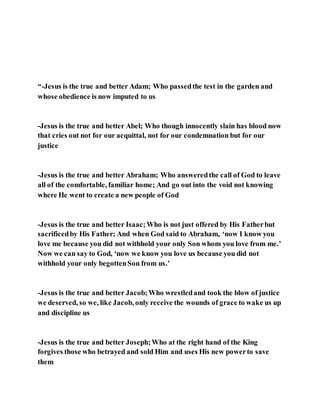
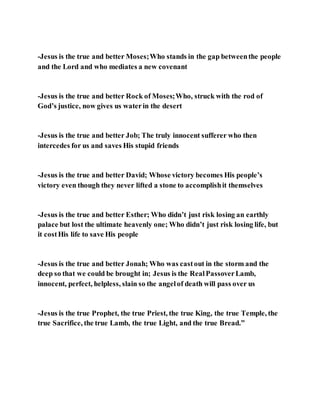
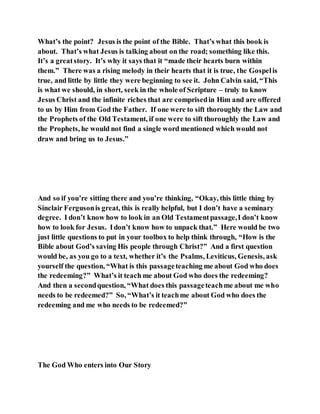
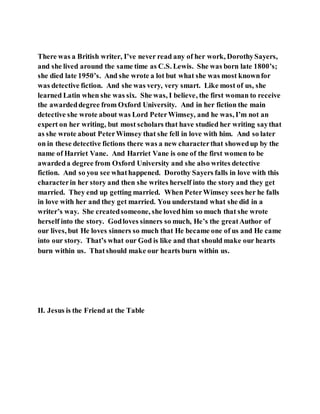
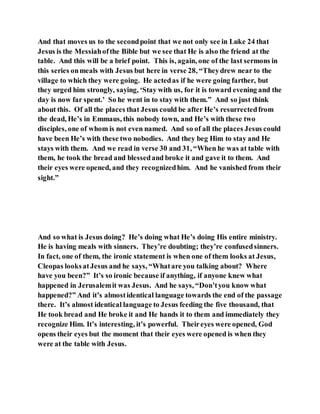
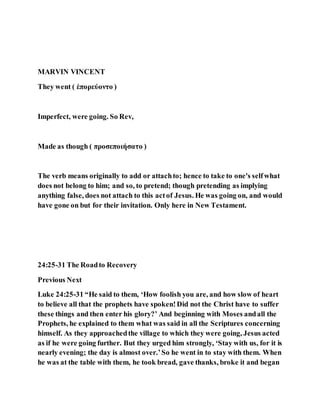
![to give it to them. Then their eyes were opened and they recognisedhim, and
he disappeared from their sight.”
Every disciple of Christ has bouts of doubt and discouragement. How does
our living Lord deal with this? Surely we can gethelp in understanding this
from this famous and beautiful incident. Two people are leaving the scene of
the crucifixion of their friend and teacherJesus Christin bleak despair, and
as they walk the sevenmiles home the risen Jesus joins them, but incognito,
and he begins to help them. Firstly he makes inquiries as to what they were
talking about and why did they appear so sad, and at this time God prevents
either of them from recognizing him. So Jesus initially is dealing with them as
if he were just a Bible-believing Christian. In other words, he doesn’t simply
cry, “Look!It’s me!” and reveal himself to them as the Son of God and the
conqueror of death. He begins by asking questions and probing to see what
their problem is and listening sincerelyto all they say.
That is where we all are to start as friends and counselors andhelpers. But I
hope we don’t stop there. I hope we don’t let people unburden themselves,
their criticisms and unhappiness on us, and then saynothing. That was the
greatly favoured approachfifty years ago and I guess it is still popular. It is
called“non-directive counseling.” We are told by its practitioners not to
impose our values on others. We are urged to let people find their own truths
about themselves and the way ahead. Well, that is not what we learn here; the
Lord Jesus couldn’t have helped them that way. Certainly he askedthem
questions and he listenedat length but then he spoke to them.
HOW THE LORD JESUS MINISTEREDTO THEM.
i] He helped them by asserting his authority over them. “He said to them,
‘How foolish you are, and how slow of heart’” (v.25). If he is going to help us](https://image.slidesharecdn.com/jesuswaspretendingandtesting-200829123525/85/Jesus-was-pretending-and-testing-110-320.jpg)
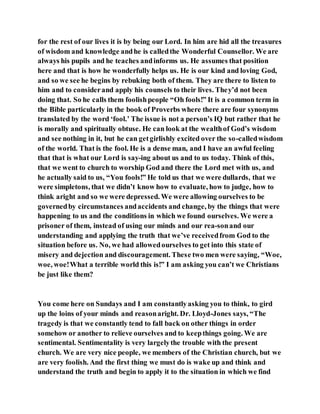
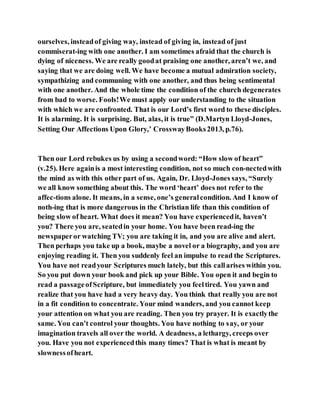
![“‘How foolishyou are, and how slow of heart!’ The devil afflicts us with this
spiritual lethargy. He seems to inject some kind of jaundice into us that
paralyzes us and makes us dull. And we cannot rouse ourselves. We canbe
ani-mated in conversationwith others, but we suddenly become speechless
when we are confronted by God. We canread other things, but not the
Scripture. This is slowness ofheart. The devil, as it were, is causing this poison
to circulate in our spiritual system. All our faculties are para-lyzed. That is
one of the troubles with depression. It affects the whole person. It affects the
muscles, and people become physically weak. Theycannot think clearly and
cannot do anything properly. Slowness ofheart. Now this is something we
must be conscious of. It is not enoughto say, ‘Well, I don’t feel like it now.’ I
should ask myself, ‘What is the reasonwhy I don’t feel like it now?’
“Slownessofheart is a condition that must be dealt with. We must stir
ourselves up. We must rouse ourselves:not only gird up the loins of our
minds, but ‘stir up the gift of God, which is in us’ (2 Tim. 1:6). Slownessof
heart was the greatdisease ofTimothy. The young man was always
complaining to the apostle Paul about his difficulties and his problems. And
that is what the apostle tells him: Stir up the gift of God, which is in you. Rake
the fire! [“Do not put out the Spirit’s fire” (IThess.5:19])Wake up! Get rid of
this dullness, this slowness,this lethargy. Shake it off. ‘Away, thou sloth and
melancholy,’ as Milton once put it” (D. Martyn Lloyd-Jones, Setting Our
Affections upon Glory, Crossway, 2013, p.78)
So our Lord doesn’t upbraid them for leaving Jerusalemand walking back
home. That was understandable given the circumstances ofthe past days and
the fragmentary information they’d received. But first he diagnoses their
condition. It is this, that they were slow of heart and foolish. Then he begins to
treat this spiritual sickness.](https://image.slidesharecdn.com/jesuswaspretendingandtesting-200829123525/85/Jesus-was-pretending-and-testing-113-320.jpg)
![ii] Jesus helped them by opening up the Scriptures to them. He told them they
should have knownand believed what God had said. That led to what
someone has called“the ultimate Bible conference.”Christ proceededto tell
them plainly that it was absolutelynecessaryfor the Messiahto suffer and die
on the cross. I receiveda magazine this week and there was a long testimony
in it by a womanin her late 60s calledWendy Underhill, and of course it was
the secondname that caught my eye as it was the same name as our beloved
Kenyan missionary Keith. Her daughter Jane Underhill had been converted
in her teens and the mother said, “Like so many of our generationI had
grown up going to church on a regularbasis. I knew the services offby heart
and many of the hymns, and had been confirmed when I was 14 years of age
in WinchesterCathedral. Yet I did not have a clue what it was all about,
especiallywhy Jesus had to die on the cross. Church felt familiar and
comfortable, something to cling onto during the bad times. But I kept God at
arm’s length, preferring instead to rely on fortune tellers and horoscopesfor
hope and security.”
This was very similar state spiritually as Cleopas and his friend. They didn’t
have a clue why Jesus had to die on the cross and then he himself began to
explain the necessityof the Messiahbecoming the Lamb of God and taking
awaythe sin of the world. What seemedlike the ultimate miscarriage of
justice turns out to be the Father’s plan to glorify his Son. Christ was no
victim being led againsthis will to the cross. No one wrestedhis life from him.
He laid it down. The cross was no accident. It was part of God’s plan from the
beginning. That’s why the prophets and the poets wrote about it. There’s a
trail of references to the suffering Messiahthroughout the Old Testament. He
must suffer and then enter his glory. Genesis 3, Genesis22, 2 Samuel 7, Psalm
16, Psalm22, Psalm 69, Psalm110, Psalm118, Isaiah7, Isaiah9, Isaiah53,
Zechariah 12, Zechariah13, Zechariah 14. The whole story from Genesis to
Malachipointed forward to a fulfillment which could only be seenwhen the
Lamb – whom God took from his own flock and from his own bosom – bore
our condemnationfor our sins in the sacrifice ofhimself on the cross.](https://image.slidesharecdn.com/jesuswaspretendingandtesting-200829123525/85/Jesus-was-pretending-and-testing-114-320.jpg)
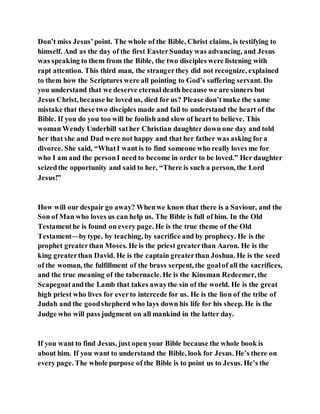
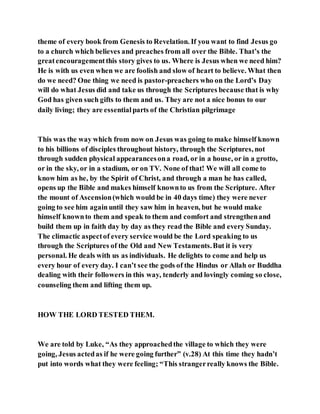
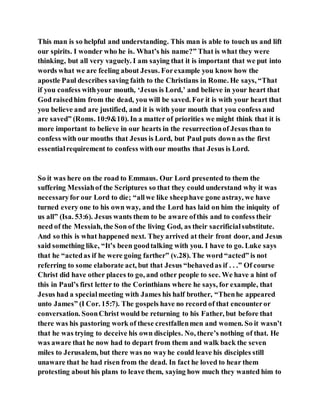
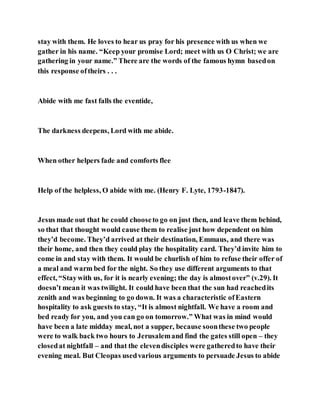
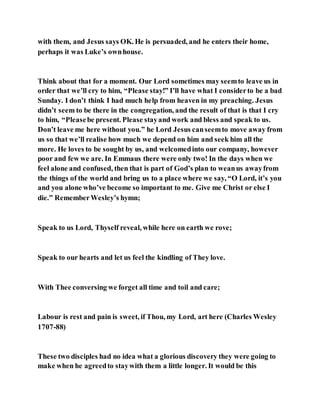
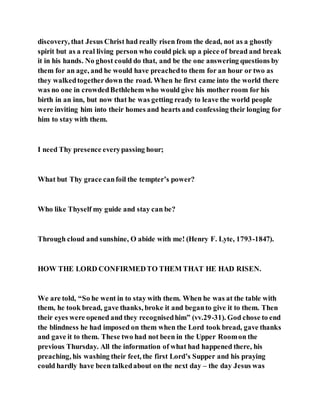
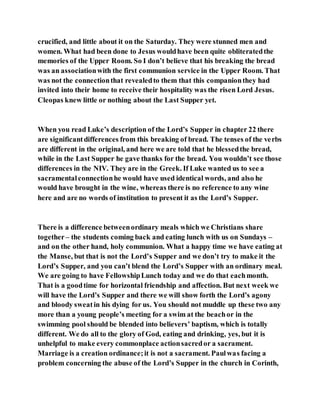
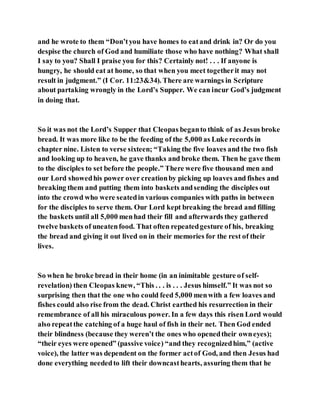
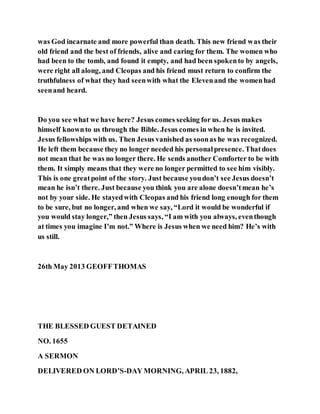
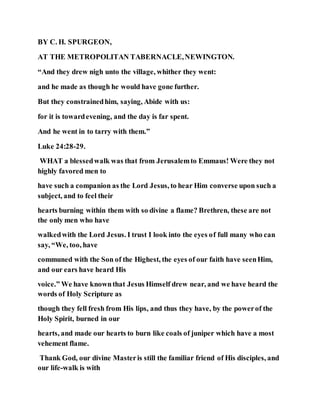
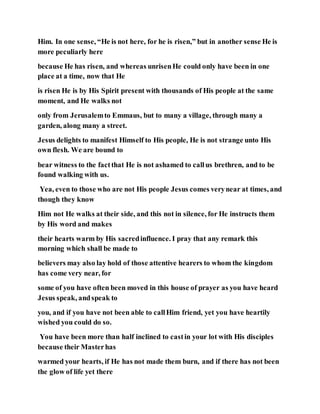
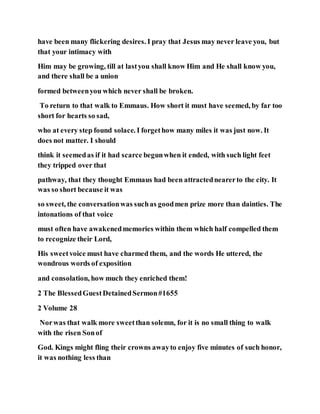
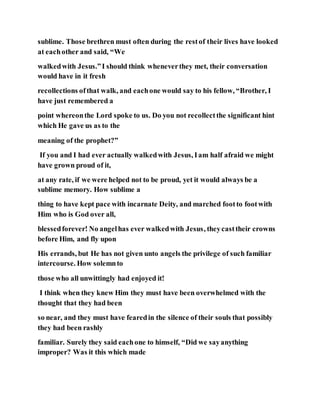
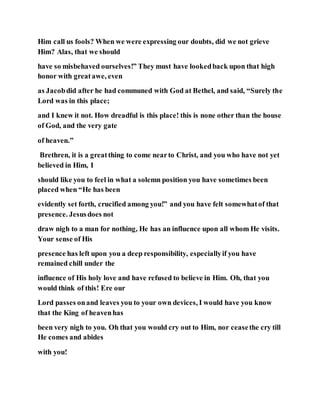
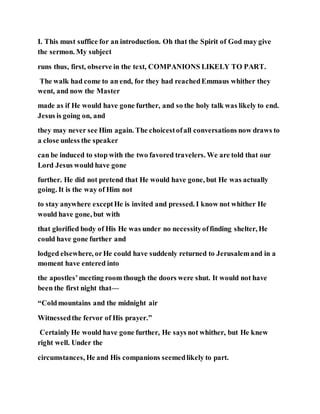
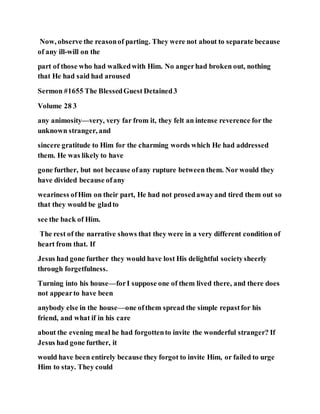
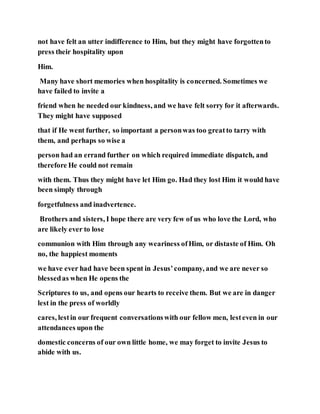
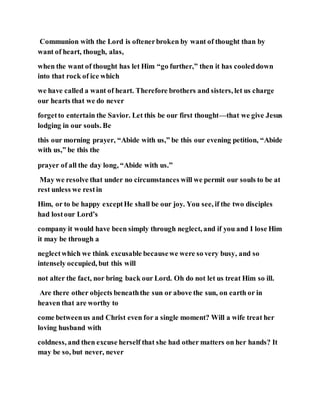
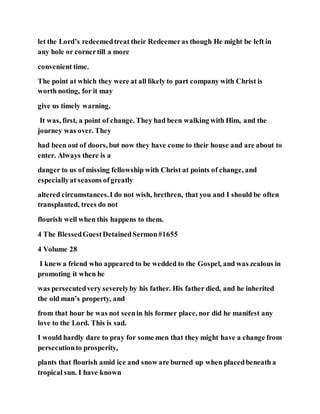
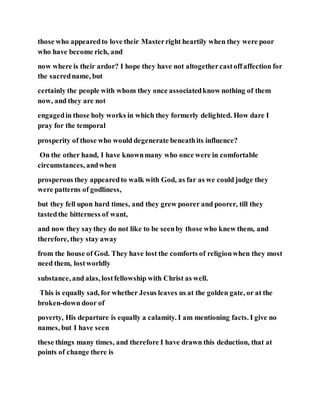
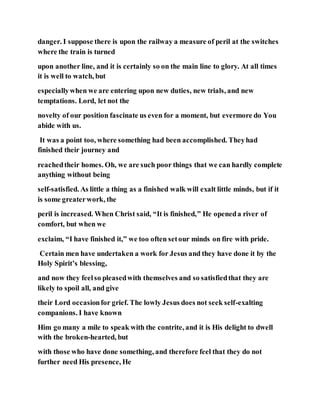
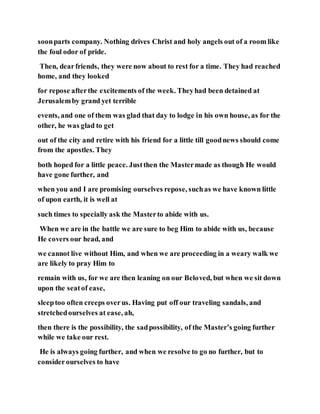
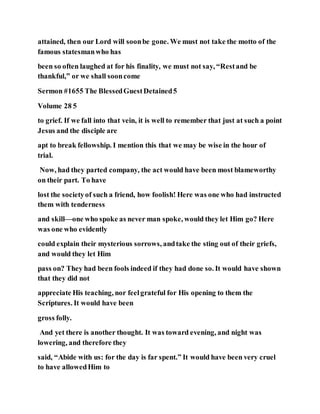
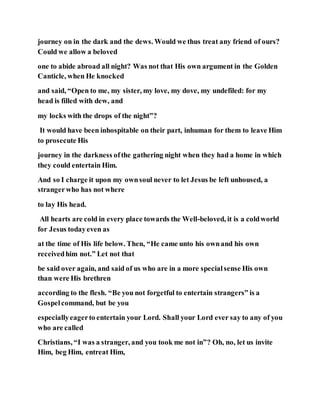
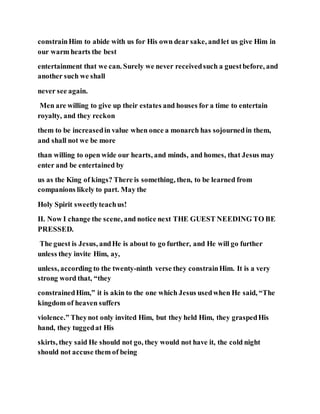
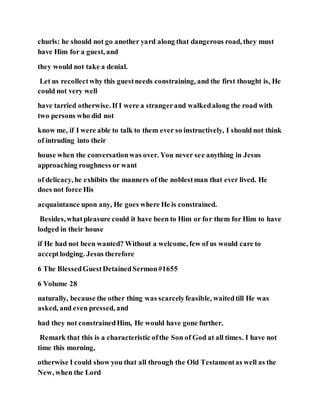
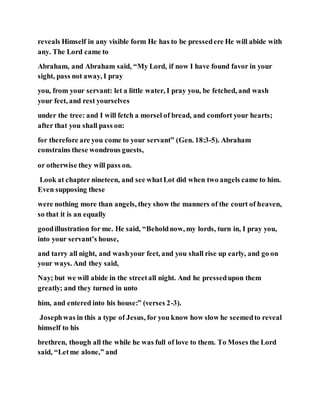
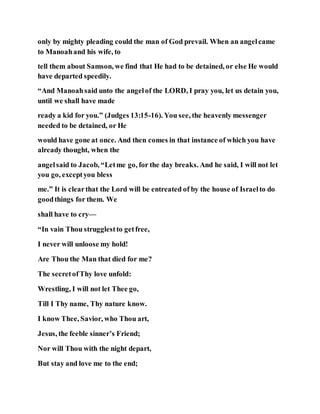
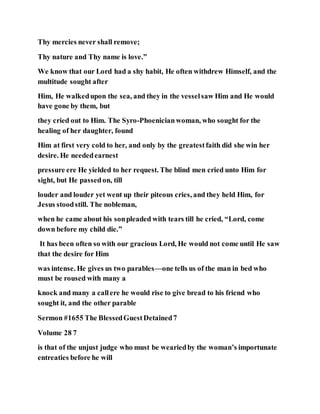
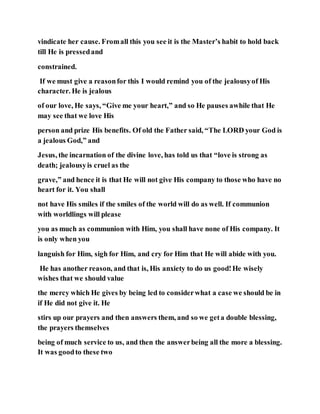
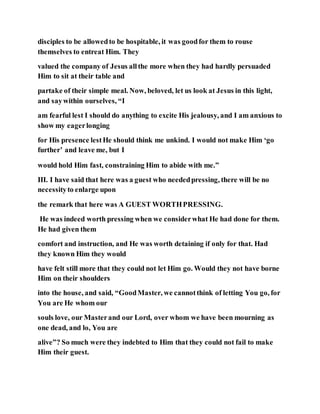
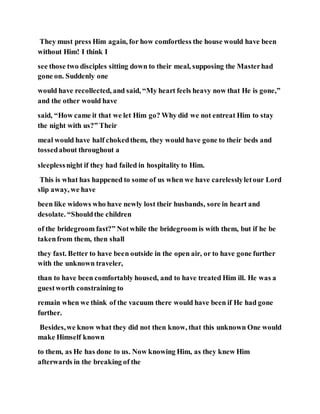
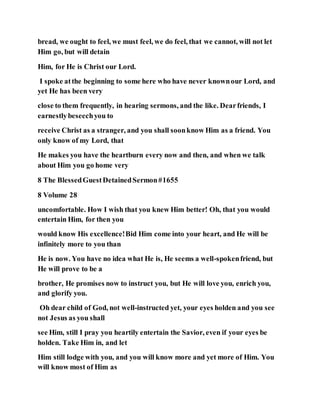
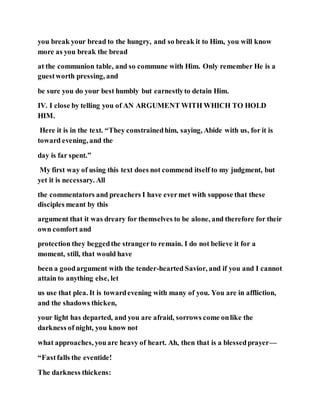
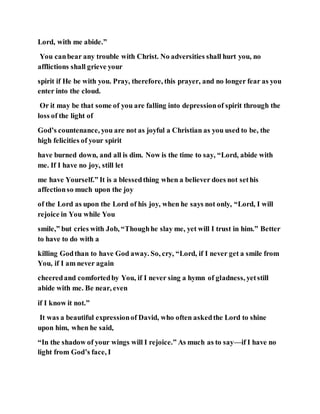
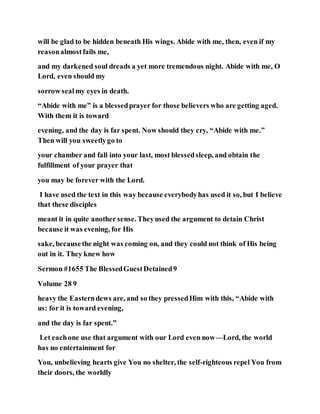
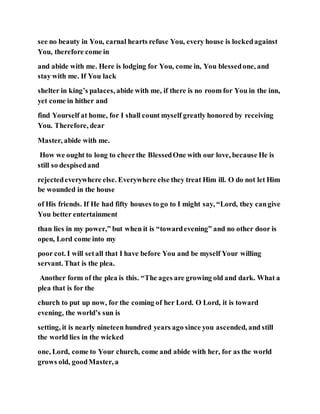
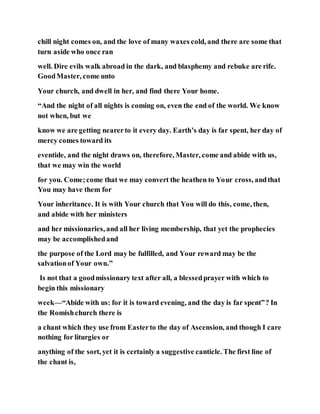
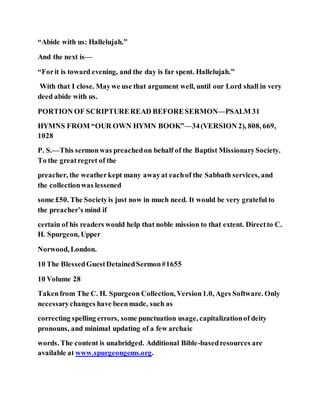
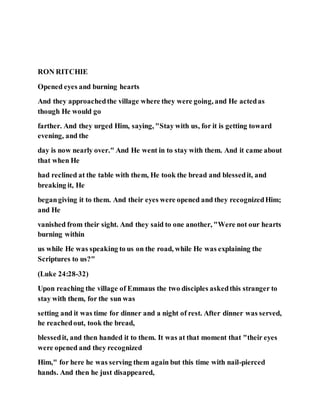
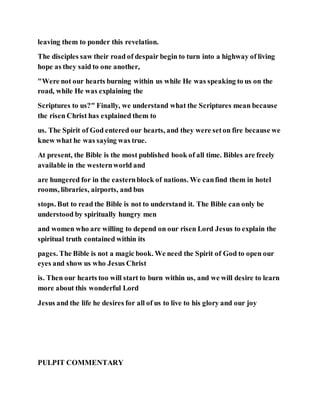
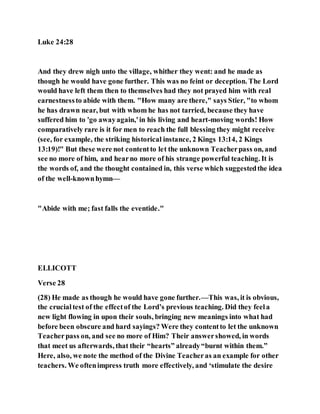
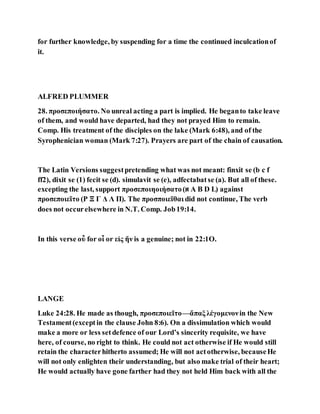
![might of love. Apparently He now shows Himself ready to say farewellto
them with the usual formula of benediction, but already they feel themselves
united to Him by such holy bonds that the thought of separationis entirely
unendurable. Entreating with the utmost urgency, they invite Him in
(παρεβιάσαντο, comp. Luke 14:23; Acts 16:15), and point Him to the sun
hurrying to its setting, in the living feeling that their spiritual light also will set
if He should leave their company. They wish to remind Him that He cannot
possibly continue His journey in the night (comp. Genesis 19:2-3;Judges
19:9), and desire that He should therefore turn in with them; since probably
one of them possesseda dwelling at Emmaus, where a simple supper was
awaiting them.
JOHN TRAPP
Verse 28
28 And they drew nigh unto the village, whither they went: and he made as
though he would have gone further.
Ver. 28. And he made as though he would, &c.] So did the angels to Lot,
Genesis 19:2. See the like, Joshua 8:5-6, 1 Kings 3:24. If Solomonmight make
as though he would do an actthat was unlawful, we may surely do the like in
things indifferent. Yet this was never done, as is well observed, but, 1. By
those that had authority over others; 2. For some singular goodto them with
whom they thus dealt.](https://image.slidesharecdn.com/jesuswaspretendingandtesting-200829123525/85/Jesus-was-pretending-and-testing-158-320.jpg)
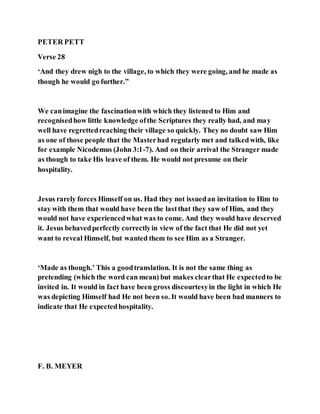
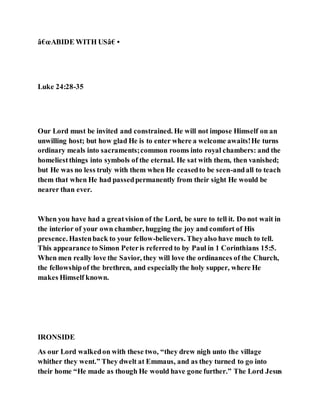
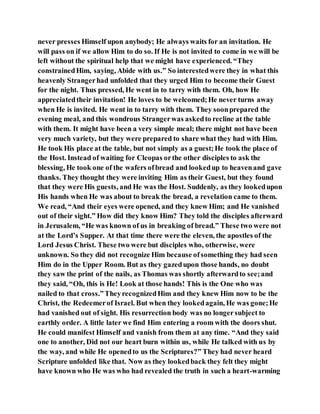
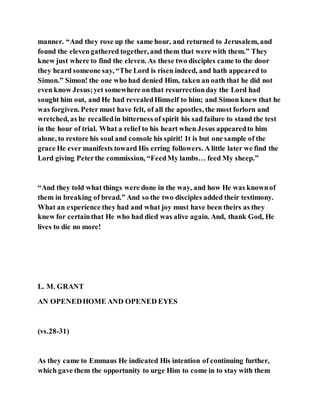
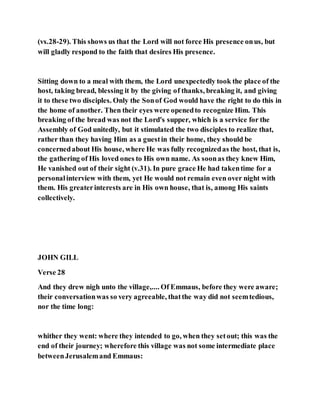
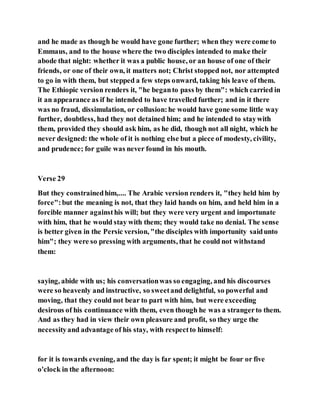
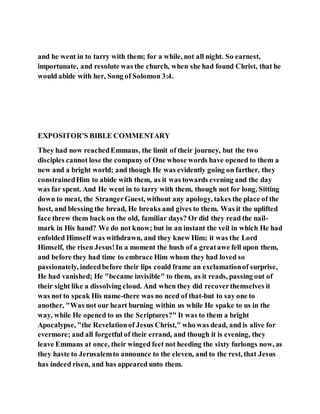
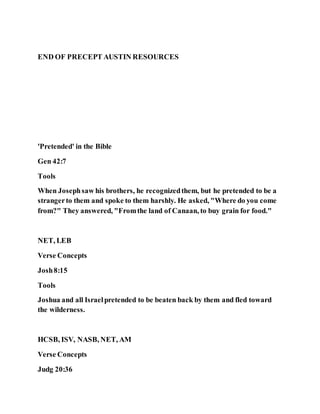
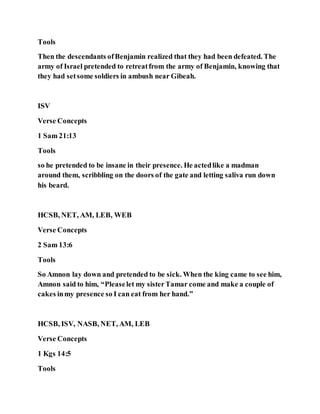
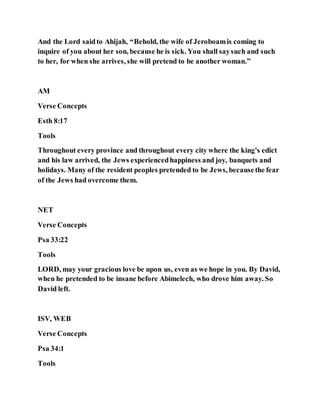
![Written by David, when he pretended to be insane before Abimelech, causing
the king to send him away. I will praise the Lord at all times; my mouth will
continually praise him.
NET
Verse Concepts
Isa 57:12
Tools
“I will declare your [hypocritical] righteousness and your deeds,Butthey will
not benefit you.
AM
Verse Concepts
Jer 3:10
Tools
In spite of all this, Israel's sister, unfaithful Judah, has not turned back to me
with any sincerity; she has only pretended to do so," says the Lord.
NET
Verse Concepts
Jer 14:14
Tools
Then the Lord said to me, “The [counterfeit] prophets are prophesying lies in
My Name. I have neither sent them nor authorized them nor spokento them.
They are prophesying to you made-up visions [pretending to call forth](https://image.slidesharecdn.com/jesuswaspretendingandtesting-200829123525/85/Jesus-was-pretending-and-testing-169-320.jpg)
![responses from handmade gods], a worthless divination and the deceitof their
own mind.
AM
Verse Concepts
Ezek 7:23
Tools
‘Prepare the chain [for imprisonment], for the land is full of bloody crimes
[murders committed under the pretense of civil justice] and the city is full of
violence.
AM
Verse Concepts
Matt 26:49
Tools
Immediately Judas went to Jesus and said, “Greetings (rejoice), Rabbi!” And
he kissedHim [in a deliberate actof betrayal].
AM
Verse Concepts
Matt 27:63
Tools
"Sir," they said, "we recollectthat during his lifetime that impostor
pretended that after two days he was to rise to life again.](https://image.slidesharecdn.com/jesuswaspretendingandtesting-200829123525/85/Jesus-was-pretending-and-testing-170-320.jpg)
![WNT
Verse Concepts
Luk 20:20
Tools
They watchedcloselyand sentspies who pretended to be righteous, so they
could catchHim in what He said, to hand Him over to the governor’s rule and
authority.
HCSB, ISV, NASB, NET, AM, LEB, WEB
Verse Concepts
Act 27:30
Tools
Meanwhile, the sailors had begun trying to escapefrom the ship. They
loweredthe lifeboatinto the sea and pretended that they were going to lay out
the anchors from the bow.
ISV
Verse Concepts
2 Thess 2:2
Tools
not to be quickly unsettled or alarmed either by a [so-calledprophetic
revelation of a] spirit or a message ora letter [allegedto be] from us, to the
effectthat the day of the Lord has [already] come.](https://image.slidesharecdn.com/jesuswaspretendingandtesting-200829123525/85/Jesus-was-pretending-and-testing-171-320.jpg)
![AM, WNT
Verse Concepts
2 Thess 2:9
Tools
The coming of the [Antichrist, the lawless]one is through the activity of Satan,
[attended] with greatpower[all kinds of counterfeit miracles]and [deceptive]
signs and false wonders [all of them lies],
AM
Source:https://bible.knowing-jesus.com/words/Pretended
Pope says, Jesus 'pretends'
Jes·u·it·i·cal
adjective
of or pertaining to Jesuits or Jesuitism.
( often lowercase )practicing casuistryor equivocation; using subtle or
oversubtle reasoning;crafty; sly; intriguing.
Or as the say you cantake the Jesuitout of the Jesuits but not the Jesuitout of
the Jesuit.](https://image.slidesharecdn.com/jesuswaspretendingandtesting-200829123525/85/Jesus-was-pretending-and-testing-172-320.jpg)
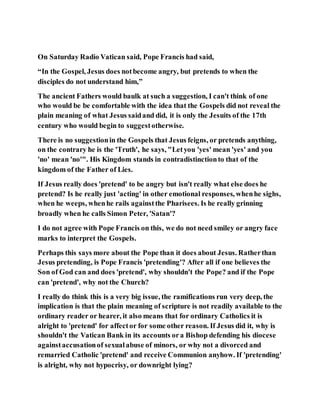
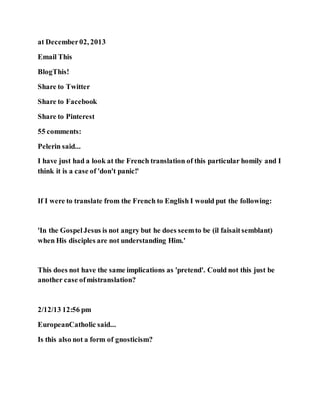
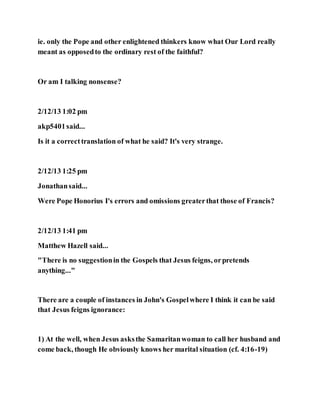
![2) In the garden, just before His arrest, when Jesus asksthe guards who they
are looking for, though He obviously knows (cf. 18:4-8, esp. v. 4)
Jesus also knew long before the Last Supper that Judas would betray Him (cf.
Jn 6:64, 70-71), yet does nothing about it. A cynic might suggestthat there is a
certain pretence here - a keeping up of appearances,if only until the right
time.
To be clear, I think it's a poor choice of words on the Pope's part, and I don't
agree that Jesus feignedHis emotions, or somehow only pretended to be
angry. If He could weepand mourn (cf. Jn 11:33-37), it stands to reasonthat
He could also become angry (e.g. cleansing ofthe temple: cf. John's citation of
Ps. 68:10[69:9]in Jn 2:17). What we might label 'negative'emotions like
anger, jealousy, etc., are not of themselves sinful, after all.
It's a more complex question than it seems at first glance, though!
2/12/13 1:49 pm
Unknown said...
I couldn't agree with you more, Father! Godbless you.
2/12/13 2:13 pm
Genty said...
Where previous popes have become more cautious and guarded in their
public utterances as they assume the papacy, the presentincumbent seems to
believe that the office of pope has given him the greenlight to say anything](https://image.slidesharecdn.com/jesuswaspretendingandtesting-200829123525/85/Jesus-was-pretending-and-testing-176-320.jpg)
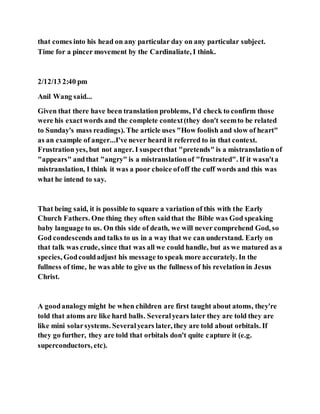
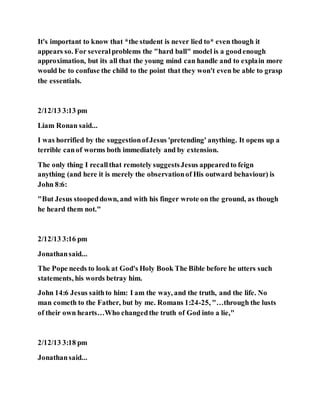
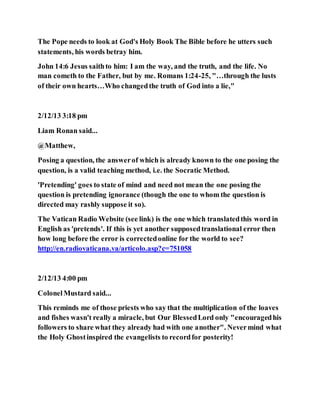
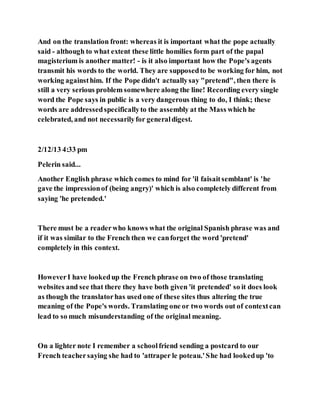
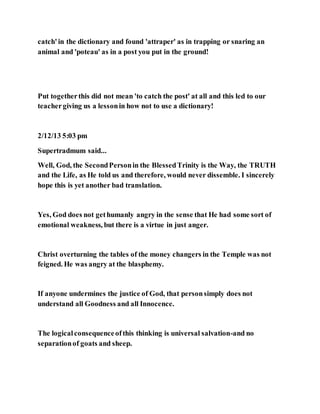
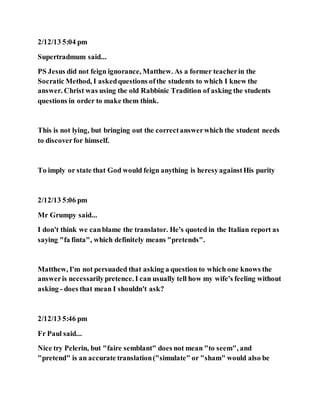
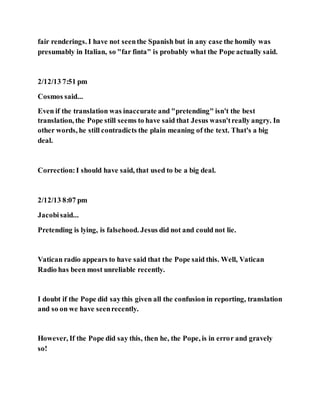
![2/12/13 8:19 pm
Adrian said...
A similar problem arises in Matt 15 26:Non est bonum sumere panem
filiorum et mittere canibus [It is not goodto take the children's bread and cast
it to the dogs]. If Jesus means this literally, he is both being extremely
discourteous to the Canaanite woman and also giving Dominicalauthority to
the idea that the Jews were 'the children' and Gentiles were 'the dogs'. The
woman's witty rejoinder, Nam et catelliedunt de micis quae cadunt de mensa
dominorum suorum [but the curs eat from the crumbs that fall from their
masters'tables] suggeststhat something in Our Lord's look or voice tells her
not to take is words too seriously. Dare we surmise that the Incarnate Word is
indulging in a little humour here?
2/12/13 8:25 pm
DeaconAugustine said...
I am sure that this is just a case ofa poor choice of words or bad reporting.
The offending sentence now reads in full:
"In the Gospel, Jesus does become angry, but pretends to when the disciples
do not understand him."
So now He DOES become angryAND pretends to as well? This is sheer
nonsense and doesn't even make sense in Humpty Dumpty land.
I know Italian is the Pope's secondlanguage, but perhaps he isn't entirely
fluent in it. Or perhaps the reporter just botched it big time.](https://image.slidesharecdn.com/jesuswaspretendingandtesting-200829123525/85/Jesus-was-pretending-and-testing-184-320.jpg)
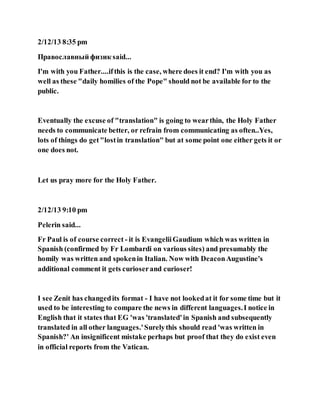
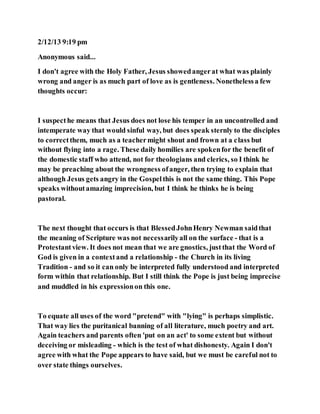
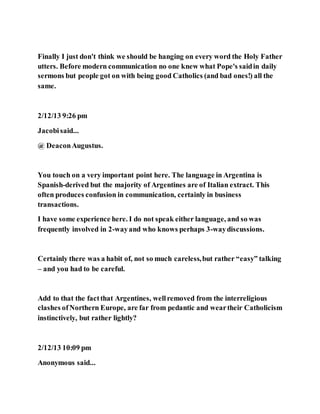
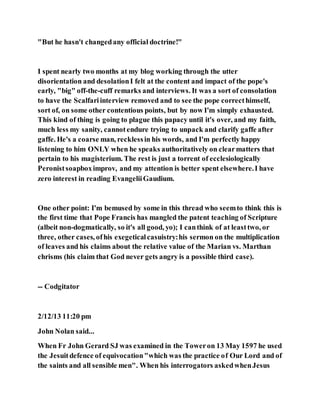
![used equivocation, he replied: "When He told His Apostles that no-one knew
the day of judgement, not even the Son of Man; and again, when He said He
was not going up to Jerusalemfor the feast[of Tabernacles]and then went.
He knew He was going when he said He was not."
Fr Gerard quotes Our Lord as saying "ego autemnon ascendam" (I,
however, shall not go up). The Clementine Vulgate, published in 1598, has the
present tense "non ascendo" whichcanmean "I am not going up yet".
2/12/13 11:43 pm
Anonymous said...
Yippee, another exegeticalepiphany from Pope Francis:
'[T]he first and the greatestofthe commandments, and the one that best
identifies us as Christ’s disciples:“This is my commandment, that you love
one another as I have loved you”'. -- EvangeliiGaudium §161
Compare this with:
'“Teacher, whichis the greatestcommandment in the Law?” Jesus replied:
“‘Love the Lord your God with all your heart and with all your soul and with
all your mind.’ -- Matthew 22:36-37
(HT to Jonathan)](https://image.slidesharecdn.com/jesuswaspretendingandtesting-200829123525/85/Jesus-was-pretending-and-testing-189-320.jpg)
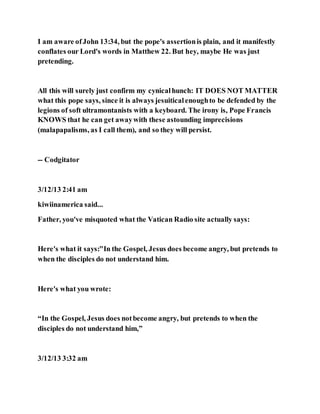
![Our Lady of Good Success-prayforus. said...
Who's the pretender? rhetoricalquestion because Christdoesn't pretend - the
Truth can't pretend.
The need to 'appeal' to the world, and 'appear' to be this or that - EG is
drowning in this exhortation to simulate 'I'm ok you're ok.'As the old joke
goes, then Christ looks downfrom the cross atthese two people
congratulating themselves on their okayness andsays, then what am I doing
up here?
One gnostic writing has Christ say, 'I did not die in reality but in appearance
...' What is Pope Francis, who doesn'twant to wearthe red shoes representing
the blood of the martyrs, like?
St John Bosco 1862:There will be an ecumenicalcouncilin the next century,
after which there will be chaos in the Church.
PF - world youth day; "I want to tell you something. What is it that I expect
as a consequence ofWorld Youth Day? I want a mess. We knew that in Rio
there would be greatdisorder, but I want trouble in the dioceses!" he said,
speaking off the cuff in his native Spanish. "I want to see the church get closer
to the people [the people? I'm a people, are you a people? or is it self-absorbed
of anyone to recognise this?]. I want to getrid of clericalism, the mundane,
this closing ourselves offwithin ourselves, in our parishes, schoolsor
structures. Because these needto getout!"
Chaos. There is no closing off - the Church has been, like a slowlyboiling frog
reaching 'out there' 'the people' world temperature for 50 years. The only
closing off that's been going on is the closing off of the wider Church from the](https://image.slidesharecdn.com/jesuswaspretendingandtesting-200829123525/85/Jesus-was-pretending-and-testing-191-320.jpg)
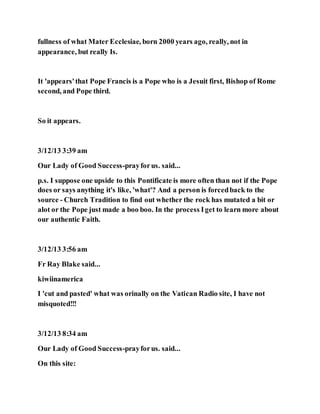
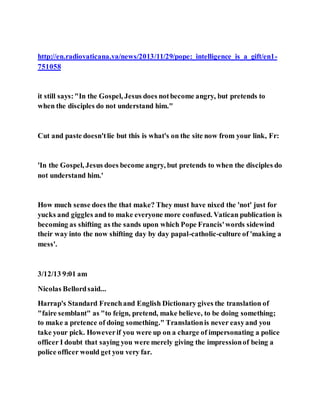
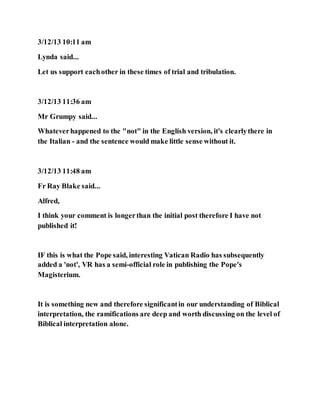
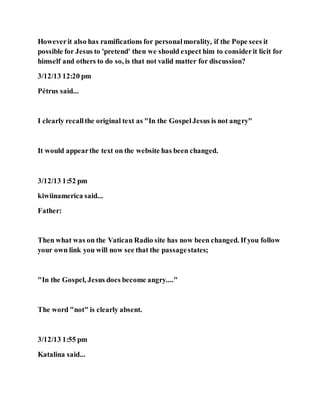
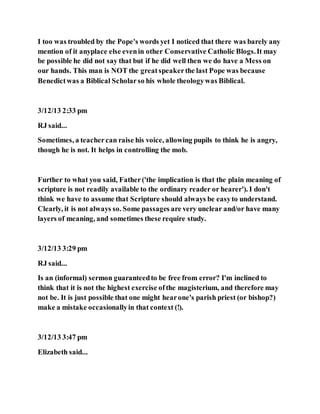
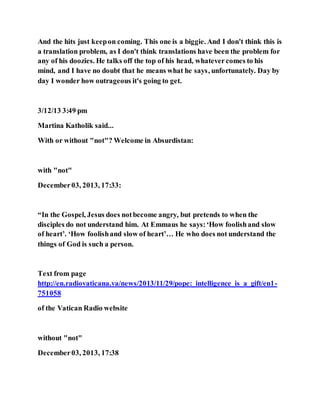
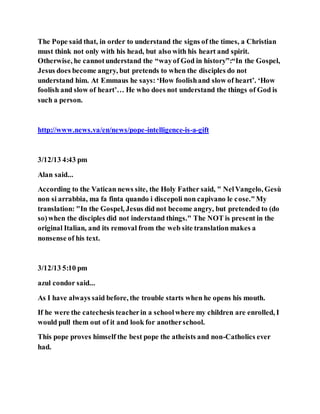
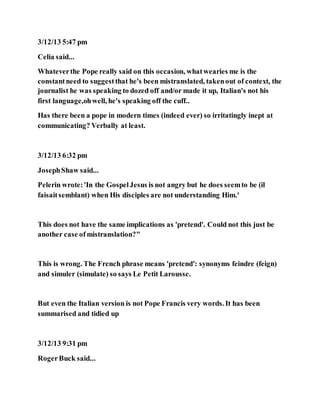
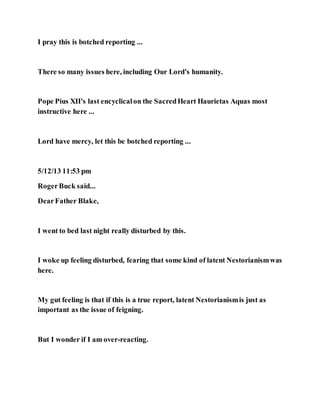
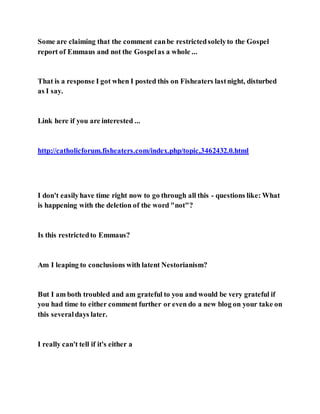
![a) a storm in a tea-cup
b) a real indication of a kind of New Agey - Nestorianismthat really rings
alarm bells for me.
So if you have time, I would be most grateful for your updated take on this.
6/12/13 10:15 am
Fr Ray Blake said...
Nestorianism?
Maybe, we all tend unconsciouslyto one particular heresy or other.
I think it is really a particularly Jesuitthing about seeing no difficulty with
'prevarication', mixed with a rather personalisedexegesisanda desire to say
something 'original' when possibly one should just shut up.
6/12/13 10:43 pm
Unknown said...
If the translation is correct, then this is at leastan erroneous assertiontending
towards heresy: the heresy which denies the absolute holiness of the human
soul of Christ - because of the hypostatic union with the Personof the Word -
as well as his freedom from ignorance and error, (pretending to be angry is
would be a type of "officious lie" on the part of Our Lord) which is at least
"theologicallycertain," as the Catholic theologians say. [saltemthelogicae
certa, quam dicuunt theologiciicatholicii...]
7/12/13 11:59 pm
Bill said...](https://image.slidesharecdn.com/jesuswaspretendingandtesting-200829123525/85/Jesus-was-pretending-and-testing-202-320.jpg)
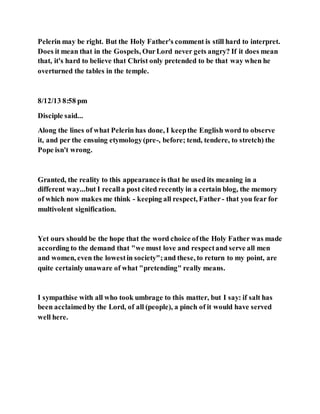
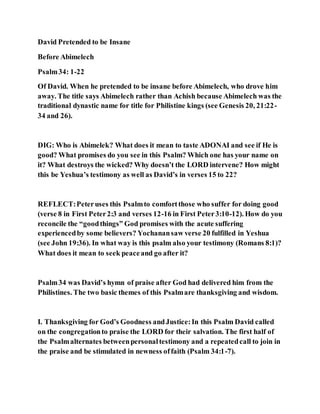
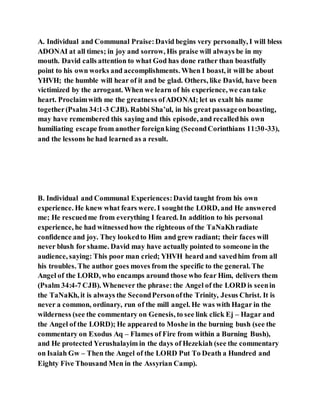
![II. In Praise and Wisdom: After affirming that God is goodto those who trust
Him, David then instructed the people how to live a long life. The lessons of
this part of the Psalm are chiefly that true goodnesscanonly be found in a
relationship with God. It is the answerto all life’s most pressing questions
(Psalm 34:8-22).87
A. Exhortation to Wisdom: Taste, andsee that ADONAI is good(Hebrews
6:5; First Peter2:3). How blessedare those who take refuge in Him! Fear
YHVH, you holy ones of His, for those who fear Him lack nothing (see the
commentary on The Life of Christ Dt – Do Not Worry about Your Life What
Your Will Eat or Drink, or What You Will Wear). Young lions can be needy,
they can go hungry, but those who see ADONAI lack nothing good. Come,
children, listen to me; I will teachyou the fear of the LORD. David writes in
the style of the wisdom instructor, as in Proverbs 1-9, with his fatherly tone
and his stress on the fearof the LORD as the beginning of wisdom.88 Which
of you takes pleasure in living? Who wants a long life (evidence of God’s
approval) to see goodthings? [If you do,] keep your tongue from evil and your
lips from deceiving talk. The sins of the tongue are severelydenounced in
Hebrew ethics. Lying and slander were deemed by the rabbis as especially
hateful to ADONAI. Turn from evil, and do good;seek peace,go afterit
(Psalm 34:8-14 CJB).
B. The Rewards ofWisdom: Historian Cassius Dio recordeda revealing event
from the life of Hadrian, the Roman Emperor 117-138AD. “Once, whena
woman made a request of [Hadrian] as he passedby on a journey, he first said
to her, ‘I haven’t time,’ but afterwards, when she cried out, ‘Then cease being
emperor,’ he turned around and grantedher a hearing.” How often we sayor
hear, “Notnow, I’m busy” or “I’m sorry, I just don’t have the time.” Yet, our
heavenly Father, the Masterand Creatorof the universe, always has the time
for us! David wrote: The eyes of ADONAI watch over the righteous, and His
ears are open to their cry. But the face of YHVH opposes those who do evil, to](https://image.slidesharecdn.com/jesuswaspretendingandtesting-200829123525/85/Jesus-was-pretending-and-testing-206-320.jpg)
![cut off all memory of them from the earth. [The righteous] cried out, and
ADONAI heard, and He savedthem from all their troubles. God is not like
the emperor or a busy executive who tries to avoid interruption. Instead, the
Father’s joy is to listen and respond to His children.89
The LORD is near to those whose spirit is crushed. David is realistic in his
portrayal of life. The righteous suffers many evils, but ADONAI rescues them
out of them all. The Torahdoes not promise immunity to the righteous; just
the contrary, just because they love ADONAI they are liable to be victimized
by the unscrupulous. He protects all their bones; not one of them gets broken.
Evil will kill the wicked, and those who hate the righteous will be condemned.
But they have their rewardin divine deliverance. ADONAI redeems His
servants;no one who takes refuge in Him will be condemned (Psalm 34:15-22
CJB). Evil will overcome the wicked. They will perish and receive their
sentence by the Judge of the world. The godly, however, will find YHVH to be
faithful. Those who trust in Him will never die.9
https://jaymack.net/ay-david-pretended-to-be-insane-before-abimelech-
psalm-34-1-22/
Religion
Did Jesus know who touched him or was pretending not to know? “And Jesus
said, Who touched me? When all denied, Peter and they that were with him
said, Master, the multitude throng thee and press thee, and sayestthou, Who
touched me?”.
Ad by FreedomDebt Relief
Proven debt settlementprogram.
Free consultation. Over 650,000 people served. Affordable 4 step program.](https://image.slidesharecdn.com/jesuswaspretendingandtesting-200829123525/85/Jesus-was-pretending-and-testing-207-320.jpg)
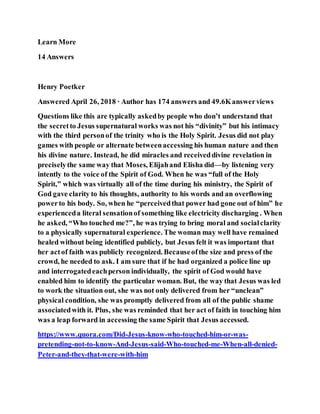
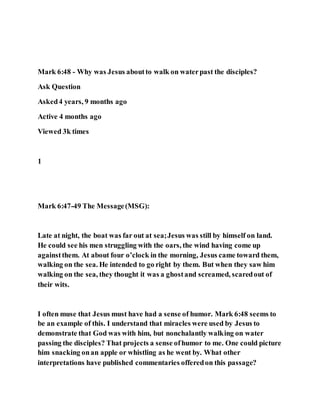
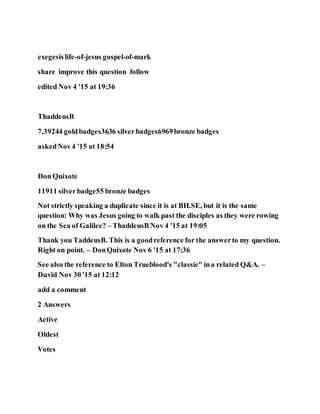
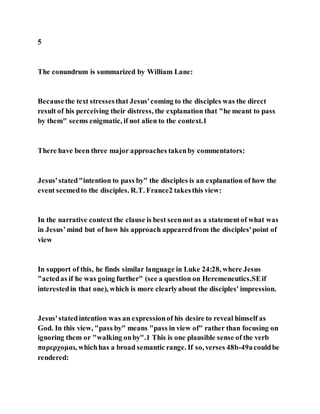
![...he came to them, walking on the sea, for he intended to pass their way. They
saw him...
Here the clause "forhe intended..." is dependent on the preceding and
provides an explanation for it. This is not the most obvious meaning of the
Greek καὶ, but it is possible. The following verse then begins a new sentence,
where the "but" in most translations is not required by the Greek.3
The emphasis on theophany in this passagefinds support in verse 50 when
Jesus reassuresthe disciples using the emphatic ἐγώ εἰμι (egō eimi) that is
part of the "divine formula of self-revelation"6. This focus on the event as
revelation of divinity does not deny that there is a shift in Jesus's planas he
walks.
Yet, precisely at this most "divine" moment...he also displays his humanness,
for his will seems momentarily to be thwarted. He wishes to pass the disciples
by for their own good, to give them a full revelation of his identity, but...he is
calledback to earth by the necessityofministering to them.7
Regardlessofwhether they understand Mark 6:48 as expressing the disciples'
viewpoint (#1) or Jesus’intention (#2), commentators consistentlyidentify a
reference to severalOld Testamenttheophanies.4 The notion of God "passing
by" recalls Moses's experienceatSinai (Ex 33:19, 22)where this same verb –
παρέρχομαι – is used in both verses in the LXX. Also, in 1 Kings 19:11, God
"passesby" (παρέρχομαι)Elijah on Horeb (1 Kings 19:11). An even closer
parallel to Mark 6 is found in the Septuagint of Job 9:8,11:
[The Lord,] who alone stretchedout the sky
and walks on the sea as on dry ground](https://image.slidesharecdn.com/jesuswaspretendingandtesting-200829123525/85/Jesus-was-pretending-and-testing-212-320.jpg)
